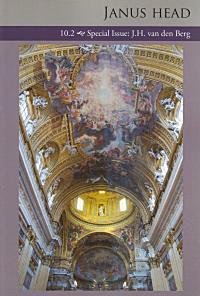 Janus Head Janus Head
10.2
Special Issue
J.H. van den Berg

Beyond Time
New & Selected Work
1977 - 2007
Robert Gibbons
 The Age of Briggs & Stratton The Age of Briggs & Stratton
Peter Culley
|
 columbine
Central Experimental Farm
Ottawa
photo - mw
_______________________
We Wear the Mask
Paul Laurence Dunbar
(June 27, 1872 – February 9, 1906)
We wear the mask that grins and lies,
It hides our cheeks and shades our eyes,--
This debt we pay to human guile;
With torn and bleeding hearts we smile,
And mouth with myriad subtleties.
Why should the world be overwise,
In counting all our tears and sighs?
Nay, let them only see us, while
We wear the mask.
We smile, but, O great Christ, our cries
To thee from tortured souls arise.
We sing, but oh the clay is vile
Beneath our feet, and long the mile;
But let the world dream otherwise,
We wear the mask!
via Brian Campbell at Out of the Woodwork
The Complete Poems of Paul Laurence DunbarProject Gutenberg
Paul Laurence Dunbar Digital Collection
Wright State University
Paul Laurence Dunbar Web
University of Dayton _______________________
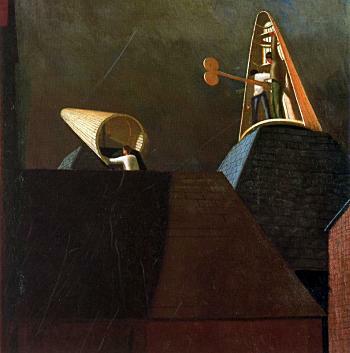
Mending Cowls, Cookham
Stanley Spencer
1915
_______________________
A Poem For The End Of The Century
Czeslaw Milosz
When everything was fine
And the notion of sin had vanished
And the earth was ready
In universal peace
To consume and rejoice
Without creeds and utopias,
I, for unknown reasons,
Surrounded by the books
Of prophets and theologians,
Of philosophers, poets,
Searched for an answer,
Scowling, grimacing,
Waking up at night, muttering at dawn.
...(more)
.....................................................

Czeslaw Milosz
(June 30, 1911-August 14, 2004)
photo by Judyta Papp
Cracow 2002
"The exile of a poet, is today a simple function of a relatively recent discovery; that whoever wields power is also able to control language, and not only with the prohibition of censorship, but also by changing the meaning of words."
-
Czeslaw Milosz, Nobel Lecture, 8 December 1980
_______________________
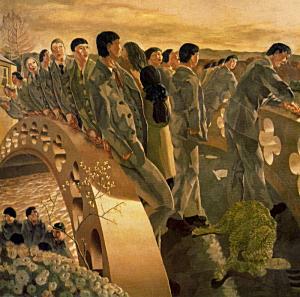
The Bridge
Stanley Spencer
1920
_______________________
Fragments on Paterson
Morgan Meis
No one knows exactly why William Carlos Williams chose Paterson as the subject and location for a new poetry. He was working on his variable triadic foot. It was a new meter, so he said. It has never been entirely clear how it’s supposed to scan. Maybe Williams himself never really understood it. But he was messing around, trying to capture the American idiom and thereby the American experience. He stayed in New Jersey while all the other Americans went to Paris or wherever chasing something they thought was going to turn out big. For some it did. For some it didn’t. Williams stayed and stayed some more. He wasn’t having fun, he was working. He was listening to the Paterson Falls and he was crafting in his forge. “No ideas but in things”: a new poetic empiricism.
*
These days Paterson is broken, let’s be honest. She has her honor, like an old hooker, but she’s broken. It is probably impossible to know what finally breaks a city, what makes it give up and fall apart into petty fiefdoms and the inability to live. All the factors, of course, play their roles: economics, politics, the ongoing terrible American abyss of race. But something else happens when a city breaks, something nobody has a handle on exactly. In that way a city can be like a person. And no one can say precisely what happens to a person when they walk outside and look at the bricks around them, the houses and buildings, and suddenly see nothing at all. What seemed to be a world of meaning around them, the context for living a life, turns into something empty and irrelevant. When that happens you’re not living in the world anymore, you’re simply existing alongside it....(more)
Project Stamps
The Owls
a site for collaborative writing projects _______________________
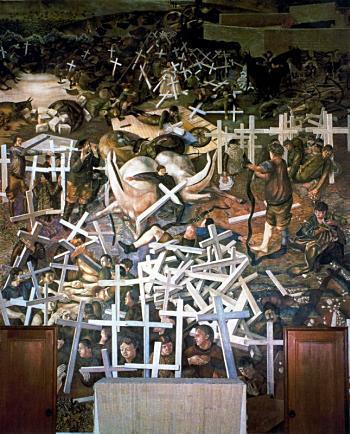 The Resurrection of Soldiers
1928-9
Stanley Spencer
(30 June 1891 – 14 December 1959
251 images
Love, Death and Resurrection:
The Paintings of Stanley Spencer
Joseph Phelan
_______________________
You Whose Name
Czeslaw Milosz
You whose name is aggressor and devourer.
Putrid and sultry, in fermentation.
You mash into pulp sages and prophets,
Criminals and heroes, indifferently.
My vocativus is useless.
You do not hear me, though I address you,
Yet I want to speak, for I am against you.
So what if you gulp me, I am not yours.
You overcome me with exhaustion and fever.
You blur my thought, which protests,
You roll over me, dull unconscious power.
The one who will overcome you is swift, armed:
Mind, spirit, maker, renewer.
He jousts with you in depths and on high,
Equestrian, winged, lofty, silver-scaled.
I have served him in the investiture of forms.
It’s not my concern what he will do with me.
A retinue advances in the sunlight by the lakes.
From white villages Easter bells resound.
_______________________

St Francis and the Birds
Stanley Spencer
1935
_______________________
Summer in the South
Paul Laurence Dunbar
The Oriole sings in the greening grove
As if he were half-way waiting,
The rosebuds peep from their hoods of green,
Timid, and hesitating.
The rain comes down in a torrent sweep
And the nights smell warm and pinety,
The garden thrives, but the tender shoots
Are yellow-green and tiny.
Then a flash of sun on a waiting hill,
Streams laugh that erst were quiet,
The sky smiles down with a dazzling blue
And the woods run mad with riot.
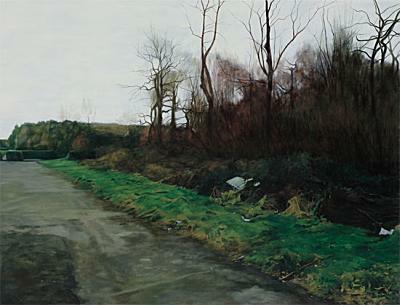
A Little Later
George Shaw: Woodsman
paintings at Wilkinson Gallery
via Riley Dog
"THERE IS NO NEW WORK. It is the old work rotting and I can't recognise it anymore. It is the old world rotting and I see it for what it is. For the first time maybe. It is departing slowly from me. Waving gently and nodding as though it will all be OK in the end, that it's just nature, just the way of things. The things that made me are in themselves becoming unmade. What appeared permanent and solid and outside of time is coming apart and falling behind itself.
Memory becomes as unreliable as forgetting. Reality lacks the poetry of melting into air. The familiar falls beyond use and lies in the way. I carry within myself an older man. His illness slows me, his dried mouth robs me of speech, his amnesia forces me to live in the today. But after all this I still cannot come to terms with the simple fact that life slips away and time is called everywhere everyday. What some may call a subject or an idea or an answer to the question what is your work about? is only an act of holding on."
_______________________
From John Latta’s blog, “Isola di Rifiuti”, May 2009
Notes, Poetics, Trouvailles, Photographs, Malarkey, and Guff
jacket 37
Isn’t it one of the perennial (impossible) reveries of art to return things to thing-hood and beings to being-hood, stripped of any human (cultural) décor or use or encrustation? Such a dream haunts Devin Johnston’s Creaturely and Other Essays (Turtle Point Press, 2009)--signal’d by an epigraph out of David Malouf’s An Imaginary Life, “The creatures will come creeping back--not as gods transmogrified, but as themselves”--long fermata bass note holding against the high treble passacaglia-work (or understory low-stealth to canopy gymnastics). For Johnston’s means of getting at the nature of beasts creaturely here is roundly (read: solidly, and layeredly, a musical round) digressive: in the spirit of Guy Davenport (capable of assembling and aligning the beams of a lecture--the walling-in accomplish’d in situ--while walking to teach at the University of Kentucky), or of A. R. Ammons, who claim’d “a poem is a walk” (and recalling, too, the terrific finely-observed natural histories of Merrill Gilfillan), Johnston writes:
In keeping with the etymology of the word digression, I drafted these essays walking around St. Louis and its environs, where I have lived since 2001. As Henry David Thoreau would say, I acted for a time as self-appointed inspector of thunderstorms and starlings, sycamores and squirrels, making my daily rounds. Weedy species and volunteers--common forms of life, opportunists like ourselves--I took as my particular charge. I sought out their local haunts, imagining what they saw, heard, smelled, tasted, and felt. En route, a poem would often come to mind, my private anthology serving as a wayward field guide to whatever I found. In that sense, the poems quoted here are less objects of study than “equipment for living” (in Kenneth Burke’s phase).
So one is offer’d wondrous randoms through things like animal senses of smell (starring the dog Chester), urban crow gang behaviors, how birds see “hues entirely unknown to us,” mouse riddance (and the Cretan “Apollo Smintheus, mouse god”), and owl ossuaries. Each essay, with modesty and patience--that is, with consummate deliberation, without flaunting one’s lore--assembles and concatenates a marvelous set of tidbits into a prose condensery (Lorine Neidecker’s word, there is a kinship between Johnston’s decant’d and finely-alloy’d prose and Neidecker’s late pieces).
...(more)
Isola di Rifiuti
_______________________
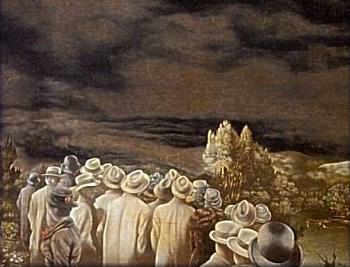
Paintings & Drawings from the 1950s & 1960s
Richard Oelze
b. June 29, 1900
_______________________
A Bloodless Coup
The Transition From Democracy To A Bnk-run Society
Mike Whitney
The underwriting of the banks with public resources changes the fundamental structure of the existing system. It's the end of free markets and the beginning of state capitalism.
_______________________

Thy Kingdom Come
1921
Max Pechstein
(December 31, 1881 – June 29, 1955)
_______________________
Wall Street’s Toxic Message
Joseph E. Stiglitz
vanity fair
Many in the developing world still smart from the hectoring they received for so many years: they should adopt American institutions, follow our policies, engage in deregulation, open up their markets to American banks so they could learn “good” banking practices, and (not coincidentally) sell their firms and banks to Americans, especially at fire-sale prices during crises. Yes, Washington said, it will be painful, but in the end you will be better for it. America sent its Treasury secretaries (from both parties) around the planet to spread the word. In the eyes of many throughout the developing world, the revolving door, which allows American financial leaders to move seamlessly from Wall Street to Washington and back to Wall Street, gave them even more credibility; these men seemed to combine the power of money and the power of politics. American financial leaders were correct in believing that what was good for America or the world was good for financial markets, but they were incorrect in thinking the converse, that what was good for Wall Street was good for America and the world.(....)
The American economy will eventually recover, and so, too, up to a point, will our standing abroad. America was for a long time the most admired country in the world, and we are still the richest. Like it or not, our actions are subject to minute examination. Our successes are emulated. But our failures are looked upon with scorn. Which brings me back to Francis Fukuyama. He was wrong to think that the forces of liberal democracy and the market economy would inevitably triumph, and that there could be no turning back. But he was not wrong to believe that democracy and market forces are essential to a just and prosperous world. The economic crisis, created largely by America’s behavior, has done more damage to these fundamental values than any totalitarian regime ever could have. Perhaps it is true that the world is heading toward the end of history, but it is now sailing against the wind, on a course we set ourselves....(more)
_______________________

The Kettledrum Organ
Paul Klee
1930
_______________________
Images as the Text: Pictographs and Pictographic Logic
Johanna Drucker and Jerome McGann
Beauty is momentary in the mind
The fitful tracing of a portal;
But in the flesh it is immortal.
-
Wallace Stevens, "Peter Quince at the Clavier"
....
Bibliographers ... regularly work from a distinction between the "substantives" and the "accidentals" of text, the latter representing what are perceived as largely secondary, formal features - like punctuation -- that merely support the conceptual core or "substance" of the text. A variant of this distinction is replicated in the more recent field of electronic textuality as the distinction between the content of text (which is logically marked) and its bibliographical forms (which go unmarked and hence are left outside the analytic framework of the electronic text). Perhaps the most widespread and manifest instance of the general distinction is the one all but universally made between a text's conceptual content and its layout, page design, and typography. In this frame of reference, graphic features of text are ancillary and transient forms -- apparitions, as it were, that house textual essences as fleshly frames support immortal souls. We bring that metaphor forward here because in our view this approach to textuality is riven by an ideology explicit in that figure of speech. This habit of thought is widespread in discussions of the history of writing systems as well as in information design. Take as an example Edward Tufte, whose work is often taken as an emblem of clarity of purpose in its presentation of apparently seamless "envisionings" of designed information. A key assumption underlying his work imagines that the information has an essential form needing to be revealed. Successful information design is measured by its capacity to bring that revelation into a form as clean and transparent as any crystal goblet. But the fact is that the graphic designs celebrated by Tufte are not vehicles for delivering coherent and pre-established information content, they are the creators of such content. This vehicular approach to material signifiers pervades our thinking about language and writing systems.
In order to shift our view away from that kind of thinking we offer here a set of programmatic examples....(more)
_______________________
Politics of translation
collected essays at Eurozine
Translation touches upon political and cultural dimensions that concern not only the translations of languages but of cultural contexts between different countries, cultures, and political systems. Since the question of translation has become a politically and culturally crucial question, one can argue that translation can be regarded as a central metaphor for some of the most pressing tasks confronting us at the beginning of the twenty-first century. Translation points at how different languages, different cultures, different political contexts, can be put together in such a way as to provide for mutual intelligibility but without having at the same time to sacrifice difference in the interest of a blind assimilation. Translation, in this sense, is about the creation of new cultural and political maps, the establishment of shared territories and of points of articulation, the development of a border reason, as opposed to the simple acceptance of the reason of the borders. It is about the right to be different, where homogenization would mean an offence, and the right to be equal, where the dwelling upon difference would be synonymous with oppression or with the prevalence of power politics.
_______________________
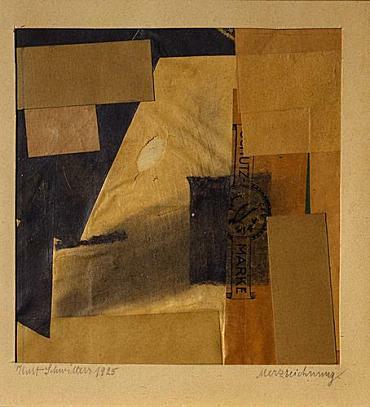
Kurt Schwitters
1925
_______________________
Thirteen Ways of Looking at a Fur-Covered Teacup
Priscilla Long
conjunctions
I believe that, in any society, the poet should be the exponent of the imagination in that society.
-
Wallace Stevens
It is the artists that do society’s dreaming.
-
Meret Oppenheim
....
3. His World
I am thinking Reading, Pennsylvania, the coal-fired world of slate and brick that Wallace Stevens was born into in 1879. I am thinking the Schuylkill River, the coal-carrying Schuylkill Canal, horses clopping down stone-cobbled streets, coal trains, the Philadelphia & Reading Railroad, railroad bridges and iron tracks and the Reading Iron Co. I am thinking apothecaries, dry goods, saddlers, shoemakers, shirtmakers, harnessmakers, printers, house painters, blacksmiths, stonemasons, brickmakers, bricklayers, tinmen, tanners, tailors, farriers, cabinetmakers, carpenters, and cutlers. I am not thinking poet. I am thinking of Stevens’s mother, Pennsylvania Dutch, reading the Bible every night to her five children. I am thinking of a saloon on every corner and a church on every other corner. An industrious, virtuous, religious, slightly inebriated town, a manufacturing town, urban center to coalfields and cow fields and steel mills, a town where commodities, not poems, are produced, transported, purveyed. I am thinking of Stevens’s father, a lawyer descended from Pennsylvania Dutch farmers, writing to his 20-year-old son, “I am convinced from the Poetry (?) you write your mother that the afflatus is not serious—and does not interfere with some real hard work.” No wonder then, that Stevens would later defend the maleness of writing poetry in an essay titled “The Figure of the Youth as Virile Poet.” No wonder he would assert, “The centuries have a way of being male.” From whence he came, real men did real work and manufactured real things, useful things—not poems—and in the process, made real money. And so, no wonder he wrote, in defense of the imagination, in defense of the artist, “The Man with the Blue Guitar”: “The man bent over his guitar,/A shearsman of sorts. The day was green.” Shearsman: one who shears sheep, a farmer, a real worker doing real work.
4. Her World
Meret Oppenheim was the granddaughter of Lisa Wenger, a suffragette, a well-known writer and illustrator of children’s books. Meret’s aunt, Ruth Wenger, was briefly married to Hermann Hesse. The maternal, Wenger side of the family was Swiss. Meret’s father was a German physician. He informed Meret that “women have never done anything in art.” At age 19, in 1932, she went to Paris to study art. At age 20 she had a passionate affair with Max Ernst. This lasted for a year, but thereafter she continued consorting with the Surrealists and other Paris artists—Picasso, Dora Maar, et al. Her own output included drawings, collages, assemblages, and plaster models of sculptures. Meret was brought up Protestant but in 1936 her family, due to its Jewish name, moved out of Germany to Switzerland to live with her grandmother and on her grandmother’s income, since in Switzerland her physician father was barred from practicing. In Paris, Meret, forced to become self-supporting, brought in income by designing clothing and jewelry. She entered into an intimate relationship with Man Ray (who famously photographed her). She became infatuated with her fellow Swiss artist, Giacometti, twelve years her senior. (Giacometti did not return her infatuation.) Her first solo show took place in 1936. Her work at this time, writes art critic Bice Curiger, exhibited “astonishing artistic maturity, not in the sense of ’consolidation,’ but of extreme self-possession.”
...(more)
_______________________
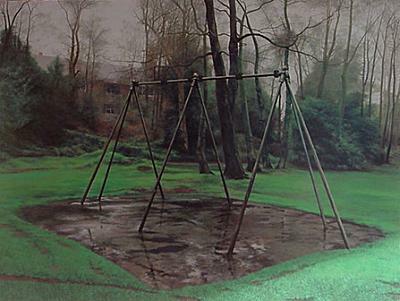
Scenes from the Passion: The Swing
George Shaw
_______________________
The real tension, I think, is between official poetry, the kind that we're taught in school and is kept in libraries, and the kind we really believe in - what we are writing and what our friends write. The same thing holds for meditation: what we discover for ourselves and learn. At some point you can forget it and go off and make a pot of spaghetti. We used to do go down to Muir Beach years ago to gather mussels off the rocks. We'd build a bonfire, put seaweed on the fire to steam the mussels. We'd eat them, then jump up and down in the waves and have fun. That was enough. Probably enough. Or too much. Oh, I guess Blake said it, "Enough, or too much." That's all.
-
Philip Whalen, About Writing and Meditation
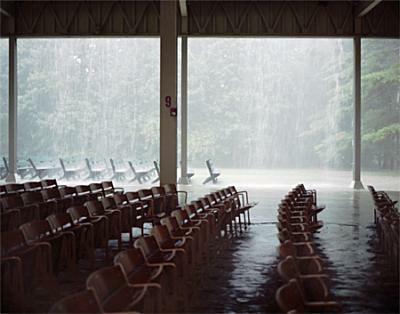
lost in paradise Rachel Sussman
_______________________
Metonymy as an Approach to a Real World
William Bronk
(1918-1999)
Whether what we sense of this world
is the what of this world only, or the what
of which of several possible worlds
--which what?--something of what we sense
may be true, may be the world, what it is, what we sense.
For the rest, a truce is possible, the tolerance
of travelers, eating foreign foods, trying words
that twist the tongue, to feel that time and place,
not thinking that this is the real world.
Conceded, that all the clocks tell local time;
conceded, that "here" is anywhere we bound
and fill a space; conceded, we make a world:
is something caught there, contained there,
something real, something which we can sense?
Once in a city blocked and filled, I saw
the light lie in the deep chasm of a street,
palpable and blue, as though it had drifted in
from say, the sea, a purity of space.
-
from The World, the Worldless (1964)
_______________________
I am a dreamer of words, of written words. I think I am reading; a word stops me. I leave the page. The syllables of the word begin to move around. Stressed accents begin to invert. The word abandons its meaning like an overload which is too heavy and prevents dreaming. Then words take on other meanings as if they had the right to be young. And the words wander away, looking in the nooks and crannies of vocabulary for new company, bad company.
- Gaston Bachelard, The Poetics of Reverie, 1960
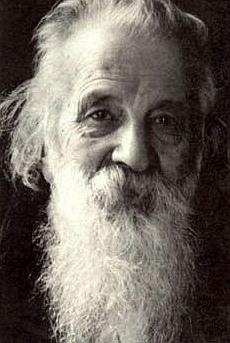
Gaston Bachelard
b. June 27, 1884
The Poetics of Reverie: Childhood, Language and the Cosmos Psychoanalysis of Fire
_______________________
Writing earlier to Mary Manning Howe of his German trip ('a journey from and not to'), he says he didn't have the energy to 'make it clear to myself', but had 'an instinctive respect, at least, for what is real, & therefore has not in its nature, to be clear'. He adds that 'when somehow this goes over into words, one is called an obscurantist', but it is 'the classifiers are the obscurantists'. Nevertheless Beckett's correspondence is 'be-thicketed' (in Paul Muldoon's phrase) with obscure local and cultural allusions, and the editorial team, with their astonishingly detailed annotations, are to be congratulated for making the life work of this heroically perverse illuminist a lot clearer.
- Hugh Haughton on The Letters of Samuel Beckett 1929-1940
_______________________

selective memory Rachel Sussman
_______________________
Representing the Unrepresentable: Compassion and Empathy
Aric Mayer
... part three in series of posts adapted from a paper titled Representing the Unrepresentable: Locating the Political in the Viewer-Image Exchange ... I read at the Aesthetics of Catastrophe symposium at Northwestern University.
Representing the Unrepresentable: A Waking DreamAric Mayer
Representing the Unrepresentable: The Mythic and the Real
Aric Mayer
_______________________
The Great American Bubble
Matt Taibbi
"From tech stocks to high gas prices, Goldman Sachs has engineered every major market manipulation since the Great Depression - and they're about to do it again"
_______________________
 turkey vulture on the local compost heap
photo - mw
A time to mourn, a time to applaud
Roger Gathman
news from the zona
Under the sign of the replay, the center will not hold – I hold this zona truth to be self evident.. America is teary eyed about the death of Michael Jackson and Farah Fawcett Majors – but I can’t shed a single drop, somehow. My tears are falling for the death of Detroit; my tears of rage are falling at the new American ethos of being a good sport, being the quiet American, being the patsy at the end of the assembly line of spiritual and material death. The workers applaud their own economic descent, while the only angry voices are those being whipped up rightwing fringe, America’s perennial lyncher’s margin. We “understand” – oh, we so understand the “market”. You can’t do anything against the market. Except, of course, we have watched that particular lie explode before our eyes as it turned out that market forces, once they brush up against the rich, can be dealt with – trillions, it turns out, will be found with astonishing speed to deal with the market then. ...(more)
_______________________

City Limits
Philip Guston
(June 27, 1913 – June 7, 1980)
Philip Guston at ubuweb
_______________________
Culture, Society & Praxis
Vol 7, No 2 (2008)
Culture, Economy, and Change
_______________________
An Idler's Glossary
Joshua Glenn
dawdle:
Paul Virilio, noting that Socrates was invariably late (atopos) to every appointment, suggests that philosophy itself is born of "idle (often pointless) curiosity, born of the disappearance of physical effort once this becomes unnecessary." And let's not forget Oscar Wilde's injunction that "punctuality is the thief of time." Dawdle, then, by all means! flâneur:
"Idle man-about-town": O, how much is contained in that definition! The flâneur practices a kind of refined street theater, thumbing his nose at hurrying urban crowds by loitering ostentatiously. For Baudelaire—who admired famous flâneurs like Nerval, who is said to have walked a lobster around Paris on a pale blue leash—the "perfect flâneur" is that urbanite who is neither aloof from the crowd nor surrendered to it, but both at once; this "kaleidoscopic" faculty allows him to perceive the subtle eruptions of the infinite into the everyday. (Clearly, the flâneur does not suffer from ennui, nor is he blasé.)
Hermenaut
_______________________
 Dove Hunters in the Wood
Ernst Ludwig Kirchner
1913
Every Picture Tells a Story
The Narrative Impulse in Modern and Contemporary Art
Selected Works
_______________________
Praise Of Folly
An oration, of feigned matter, spoken by Folly in her own person
Desiderius Erasmus
(c. 1466-1536)
Translated by John Wilson,1688
...what the otherwise great rhetoricians with their tedious and long-studied orations can hardly effect, to wit, to remove the trouble of the mind, I have done it at once with my single look.
(...)
And here again do those frogs of the Stoics croak at me and say that nothing is more miserable than madness. But folly is the next degree, if not the very thing. For what else is madness than for a man to be out of his wits? But to let them see how they are clean out of the way, with the Muses' good favor we'll take this syllogism in pieces. Subtly argued, I must confess, but as Socrates in Plato teaches us how by splitting one Venus and one Cupid to make two of either, in like manner should those logicians have done and distinguished madness from madness, if at least they would be thought to be well in their wits themselves. For all madness is not miserable, or Horace had never called his poetical fury a beloved madness; nor Plato placed the raptures of poets, prophets, and lovers among the chiefest blessings of this life; nor that sibyl in Virgil called Aeneas' travels mad labors. But there are two sorts of madness, the one that which the revengeful Furies send privily from hell, as often as they let loose their snakes and put into men's breasts either the desire of war, or an insatiate thirst after gold, or some dishonest love, or parricide, or incest, or sacrilege, or the like plagues, or when they terrify some guilty soul with the conscience of his crimes; the other, but nothing like this, that which comes from me and is of all other things the most desirable; which happens as often as some pleasing dotage not only clears the mind of its troublesome cares but renders it more jocund. And this was that which, as a special blessing of the gods, Cicero, writing to his friend Atticus, wished to himself, that he might be the less sensible of those miseries that then hung over the commonwealth.
_______________________

storm brewing
Smiths Falls
photo - mw
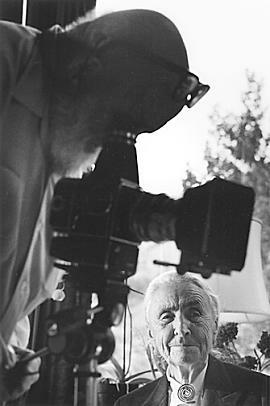
An Enduring Friendship
Ansel Adams & Georgia O'Keeffe
Scott Nichols Gallery via gmtPlus9 (-15)
Photographs by Ansel Adams, Morley Baer, Horace Bristol, Paul Caponigro, William Clift, Imogen Cunningham, Philippe Halsman, Lotte Jacobi, Yousuf Karsh, Mark Klett, Arnold Newman, Eliot Porter, Alan Ross, Paul Strand, Todd Webb, and Brett Weston
_______________________
note on the the calendar as a prison
Limited Inc
There’s a certain magical attachment in history to years. A year serves not only as an organizing principle, but also as a spell – it gathers around itself a host of connotations, and soon comes to stand for those connotations. Yet, what would history be like if you knocked out the years, days, weeks, centuries? How would we show, for instance, change? In one sense, philosophical history does just that – it rejects the mathematical symbols of chronology as accidents of historical structure. These are the crutches of the historian, according to the philosophical historian. Instead, a philosophical history will find its before-after structure in the actual substance of history. In the case of the most famous philosophical history, Hegel’s, a before and after, a movement, is only given by the conceptual figures that arise and interact in themselves. To introduce a date, here, is to introduce a limit on the movement of the absolute. A limit which, moreover, from the side of the absolute, seems to be merely a superstition, the result of a ceremony of labeling founded on the arbitrary.
On the other hand, perhaps, under the mask of the arbitrary, there lurks the new, a moment of some kind that breaks absolutely with the absolute....(more)
_______________________
Doveglion: Collected Poems of José Garcia Villa
Review by Craig Santos Perez
Blogslinger
.....................................................
from the ghost of the harvest madonna
Craig Perez
elimae
The Closed Gates Of Tomorrow. Singers with pure, clear voices dispel evil spirits at the autumn harvest by carving gourds. The boy runs his hands through his hair in an attempt to harvest his thoughts. Ghost nets, often kilometers long, are mainly lost or discarded from fishing vessels in Asian waters. Harvest Home / Balcony / Flag of Nations The boy reads the sign: "No Swimming."
_______________________

Apsens
Northern New Mexico
Ansel Adams
1958
_______________________
Vague Terrain 07: Sample Culture (Re)launched
This is Not Memorex
Greg J. Smith
In familiarizing myself with this work over the past few weeks, I've felt an odd sense of nostalgia developing. These projects collectively highlight various facets of what we have dubbed sample culture, that is the continued evolution of the triumph of the fragment. There are dozens of threads that can be traced back to the 1980s and while I am personally indebted to the potent combination of Brian Eno and David Byrne, the perpetual litigation of Negativland, and the sonic collage of the Bomb Squad, I am going to instead direct my attention to another dusty artifact from collective memory.(....)
... regardless of how we frame it, sampling is essentially an act of curation. Specific fragments are foregrounded and implicit in that selection is the exclusion of countless other memories and moments. The endgame in the act of sampling, whether reconsidering the familiar or resurrecting the forgotten, is to create an arena for discourse. In examining the constellation of projects we have brought together a few themes begin to emerge.
First, and most directly related to the sound-history sketched out above is a very diverse range of musical endeavours which collectively engage the genres of classical, dub, disco, electroacoustic, folk, hip hop, house, and techno. The work presented by Des Cailloux et Du Carbone, Eskaei, Freida Abtan, Jakob Thiesen, Noah Pred, and Ortiz all engage multiple traditions and in doing so challenge modes of production and performance. In keeping with our mandate to get musicians talking about their work outside of artists’ statements, we had Evan Saskin engage in thoughful dialogue with Ezekiel Honig of Microcosm Music.(....)
This issue of Vague Terrain also features a pair of texts that aid in delineating the landscape of contemporary mashup and remix thought. Regressive and Reflexive Mashups in Sampling Culture by Eduardo Navas is an ambitious schematization of the mashup phenomenon that traverses thirty years of musical and informational paradigms. Rebekah Farrugia has provided a thorough documentation of intellectual property and copyright issues with her text Sample Culture and Copyright in the Digital Age and this is complemented by the latest edition of her Copyright, Culture (remixed) video collaboration with Jennifer A. Machiorlatti. _______________________

O'Keeffe's Studio at Abiquiu House
Todd Webb
1963
_______________________
Interview with Cumhuriyet
Justin Erik Halldór Smith
I think the content of the claims of creationists, whether of the Old Testament literalist school or of the intelligent-design school, are entirely without interest. To the extent that their movement is interesting, it is so as a social and political phenomenon. One interesting question is why it only gains traction in certain societies, e.g., Turkey and the United States, and not so much in others, such as Saudi Arabia and Sweden. It seems to me that in the Saudi Arabian case we are looking at a society in which what the individual citizen thinks about matters such as this is of no consequence, as long as the citizen behaves in the way that the state dictates. In the case of Sweden there is a high degree of freedom of expression, coupled with high science literacy and a general lack of interest in fundamentalist or revivalist religious movements. But in the US and Turkey both there is robust and chaotic democracy, with different factions competing to have their vision of the social good predominate. Couple these with mediocre science education, a proneness towards populist suspicion of elite expertise, and a religious tradition that cannot easily accommodate the thought that humans are a particular kind of animal, and what do you have? The spurious pseudoscience of people like Henry M. Morris and Harun Yahya. ...(more)_______________________

Aspens
Brett Weston
_______________________
The Market as Purgatory
Jens Jessen
translated from the German by Jeff Craig Miller
logos
The New Capitalism is a totalitarian movement also in that it neither can nor will come to rest until it has comprehended the entire earth, and placed into private hands all that had once been subject State or citizenry. This demonic will-to-self-replication and the leveling of all differences stands exactly at the center of Hannah Arendt’s famous study The Origins of Totalitarianism. Among these origins belongs the distinctive hostility to the State exhibited by totalitarian ideologies, which, not by accident, wish to see themselves not as parties but rather as movements. All that is rule-bound, manageable and therefore static must melt into air before the dynamic principle of the Movement. All that is individual, traditional, culturally specific and intractable must pass through Capitalism, as through the purifying fires of Purgatory, to emerge in a world that is uniform and redeemed.
The awkward thing, even for the true believer, is that can never be specified when the Movement’s goals will have found their fulfillment. “Those who march off to impose their image upon the world cannot be satisfied with only a mediocre portrait. The defective reflection of themselves will prompt them tear up the copy, and begin again from scratch”, wrote the Indian author Amitav Gosh in our series, and one could continue with Hannah Arendt: “The unbounded process of an endless accumulation of power, which offers and enjoys an ever-renewed expansion for expansion’s sake, requires a constant supply of new material in order to renew itself, and not grind to a halt.” Or, once again, with Amitav Gosh: “The melding of Capitalism and Imperium means a program of permanent war – an idea which once intoxicated the Trotskyites and which the neo-conservatives have now embraced with their project for the New American Century.”
The point of this, if one may pursue the totalitarian analogy, lies not in the satisfaction of ends, but the maintenance of a state of constant uncertainty, so people can be kept from developing the faculty of judgment, and thus kept from acts of resistance. Herein lies the reason for the characteristic anti-intellectualism of the New Capitalism, which seeks everywhere to discredit potentially critical forms of high culture, in favor of a vacuous mass entertainment (allegedly because high culture can’t be competitive.) “The consistent suppression of all the higher forms of intellectual activity under the modern leaders of the masses has”, again according to Hannah Arendt, “a deeper origin than the natural animosity to all that one doesn’t understand. Total dominance can allow no breathing room for free initiative. “
Similarly, the American sociologist Richard Sennett has described, in our series, the paralysis of independent initiative. “The new insecurity is not at all an unintended outcome of an unstable market; it is programmed into the New Capitalism. It is not an unwanted, but a desired element.” And further: it is embedded deeply in the organizational structure of the modern enterprise with its flat hierarchies constant changes at the managerial level. “The continual purges, the sudden ups and downs of work careers hinder any ability to really learn the job at hand and the development of a secure working-life experience” writes, no longer Richard Sennett on the New Capitalism, but Hannah Arendt, again, on the Soviet bureaucracy under Stalin....(more)
Logos
a journal of modern society & culture
_______________________
TypeIt.org - Type foreign characters easily
Tomasz P. Szynalski
...through the miracles of Unicode and JavaScript, you can just navigate to this site, type whatever you need to type in a text box, and then paste it wherever you need it — into your word processor, e-mail message, etc. You can type foreign characters by clicking buttons or by pressing intuitive keyboard shortcuts (Ctrl+Letter) that don't require you to grow additional fingers and don't block normal letters.
via Blogos
_______________________

Point Lobos
Brett Weston
_______________________
MAN, n.
An animal so lost in rapturous contemplation of what he thinks he is as to overlook what he indubitably ought to be. His chief occupation is extermination of other animals and his own species, which, however, multiplies with such insistent rapidity as to infest the whole habitable earh and Canada.
-
Ambrose Bierce, The Devil's Dictionary

The Toy Shop
1962
Peter Blake
b. 25 June 1935
_______________________
the blog and turfs and the brandywine bankrompers
Finnegans Wake
Part:3 Episode:14 Page:510
-- Booms of bombs and heavy rethudders?
-- This aim to you!
-- The tail, so mastrodantic, as you tell it nearly takes your
own mummouth's breath away. Your troppers are so unrelieved
because his troopers were in difficulties. Still let stultitiam done
in veino condone ineptias made of veritues. How many were
married on that top of all strapping mornings, after the midnight
turkay drive, my good watcher?
-- Puppaps. That'd be telling. With a hoh frohim and heh
fraher. But, as regards to Tammy Thornycraft, Idefyne the lawn
mare and the laney moweress and all the prentisses of wildes to
massage him.
-- Now from Gunner Shotland to Guinness Scenography.
Come to the ballay at the Tailors' Hall. We mean to be mellay on
the Mailers' Mall. And leap, rink and make follay till the Gaelers'
Gall. Awake ! Come, a wake ! Every old skin in the leather world,
infect the whole stock company of the old house of the Leaking
Barrel, was thomistically drunk, two by two, lairking o' tootlers
with tombours a'beggars, the blog and turfs and the brandywine
bankrompers, trou Normend fashion, I have been told down to
the bank lean clorks? Some nasty blunt clubs were being operated
after the tradition of a wellesleyan bottle riot act and a few plates
were being shied about and tumblers bearing traces of fresh
porter rolling around, independent of that, for the ehren of Fyn's
Insul, and then followed that wapping breakfast at the Heaven
and Covenant, with Rodey O'echolowing how his breadcost on
the voters would be a comeback for e'er a one, like the
depredations of Scandalknivery, in and on usedtowobble sloops off
cloasts, eh? Would that be a talltale too? This was the grandsire
Orther. This was his innwhite horse. Sip?
-- Well, naturally he was, louties also genderymen. Being
Kerssfesstiydt. They came from all lands beyond the wave for
songs of Inishfeel. Whiskway and mortem! No puseyporcious
either, invitem kappines all round. But the right reverend priest,
Mr Hopsinbond, and the reverent bride eleft, Frizzy Fraufrau,
were sober enough. I think they were sober. _______________________
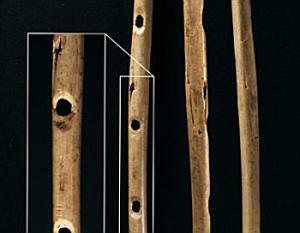
Prehistoric flute
35,000 years
"...unambiguously the oldest instrument in the world" Hohler Fels
_______________________
The Journal of a Disappointed Man
June 11, 1916
Old systems of Classification: Rafinesc’s Theory of Fives, Swainson’s Theory of Sevens, Edward Newman’s book called Sphinx Vespiformis tracing fives throughout the animal world, Sir Thomas Browne’s Quincunx, chasing fives throughout the whole of nature — in the words of Coleridge, ‘quincunxes in Heaven above, quincunxes in the Earth below, quincunxes in the mind of man, in optic nerves, in roots of trees, in leaves, in everything!’
. . . . . . .
Old false trails:
The Philosopher’s Stone (Balthazar Clæs).
A universal catholicon (Bishop Berkeley’s tar-water).
Mystical numbers (as per above).
The Complete Works of W. N. P. Barbellion
_______________________

Twisted Tree
Ta Prohm
John McDermott
_______________________
The Master List of Free Language Learning Resources
via Open Culture
_______________________
Will The Cat Above The Precipice Fall Down?
guest post from Slavoj Žižek
An und für sich
When an authoritarian regime approaches its final crisis, its dissolution as a rule follows two steps. Before its actual collapse, a mysterious rupture takes place: all of a sudden people know that the game is over, they are simply no longer afraid. It is not only that the regime loses its legitimacy, its exercise of power itself is perceived as an impotent panic reaction. We all know the classic scene from cartoons: the cat reaches a precipice, but it goes on walking, ignoring the fact that there is no ground under its feet; it starts to fall only when it looks down and notices the abyss. When it loses its authority, the regime is like a cat above the precipice: in order to fall, it only has to be reminded to look down…(....)
The future is uncertain – in all probability, those in power will contain the popular explosion, and the cat will not fall into the precipice, but regain ground. However, it will no longer be the same regime, but just one corrupted authoritarian rule among others. Whatever the outcome, it is vitally important to keep in mind that we are witnessing a great emancipatory event which doesn’t fit the frame of the struggle between pro-Western liberals and anti-Western fundamentalists. If our cynical pragmatism will make us lose the capacity to recognize this emancipatory dimension, then we in the West are effectively entering a post-democratic era, getting ready for our own Ahmadinejads. Italians already know his name: Berlusconi. Others are waiting in line....(more)
_______________________
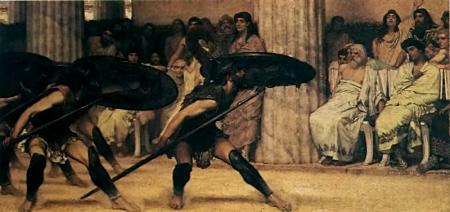
A Pyhhric Dance
Lawrence Alma-Tadema
d. 25 June 1912
_______________________
"The Style is on the Inside"
Daniel Green on Susan Sontag's "On Style" (Against Interpretation)
The Reading Experience
Much of Sontag's essay is concerned to break down the opposition between "style" and "content," but unlike others who sometimes complain about the persistence of this opposition but do so mostly in order to banish "style" from critical discussion altogether--it's just the writer's way of communicating his/her content--Sontag maintains it is content that should recede, becoming simply the word for a "special stylistic convention." Style is the real substance of art, content its outer decoration, the enticement to the reader's attention that allows the "experience" of art that style enables.
Sontag was unfortunately denied her wish that critical theory might move "to examine in detail the formal function of subject-matter." Academic criticism has gone in precisely the opposite direction, dismissing form altogether in order to focus on the "subject-matter" that satisfies the critic's pre-established theoretical disposition, while there's very little "critical theory" at all in general-interest publications of the sort that once published writers like Susan Sontag. Essentially, the debate over the fraught relationship between "style" and "content" is about where Sontag left it....(more)
_______________________

Face in the Window
The Bayon
Images of Asia
John McDermott Photography
_______________________
Does a humanity torn between its animal impulses and the failure of its jumps towards pseudo angelica worlds testify of an incurable brutality? To learn it, isn't the rational knowledge the new pedagogue of hope? An anthropology based on the psychophysiologic observation of theologies and attentive to the diversity of their schizoid representations of the world appeals as well to the spectrography of religious beliefs according to times and places as to the weighing of the bipolar mental structure which orders them all.
The religious American unconscious caught in the trap of torture
Manuel de Diéguez
translated by Marilyse Devoyault Uncommon Thought Journal
The Stalinist goulags were supposed to purify the world of its capitalist profit plague. They were working on the lustral model of conversion and redemption of the sinner. The labour camps were at the same time punitive and purifiers. The new catechism was managed with roughness. It was leading the sinner to an Eden at the same time far away and about to land from one moment to another. When the fanaticism of proletarian salvation had seized the Marxist myth, it had accumulated the pieces of corpses of Pol Pot. In front of such titanic setbacks, democratic holiness believed to have won their case all the more that the recalcitrance of Karl Marx's victims to conquer freedom, equality and fraternity to the price of the extinction of capitalist profit appeared inveterate. How come that under conditions looking that favourable, the invasion of the American democratic edenism caused a revulsion more immediate and more violent than that which had taken away the tyranny of a Soviet leading class as infidels to its own orthodoxy as the Roman clergy toward the Gospels?
Initially, the prophets of the New World could not believe their eyes concerning how the stubborn impiety of the Iraqi people made Iraqis take arms against the New World's holy idealities. And yet, the new religion of redemption and of salvation was self confident, devilishly jaunty, full of sufficiency and forfantery. Wasn't its natural lightness the legitimated product of its innate innocence? But it was too much convinced of the inferiority of the different people remained on earth and located at a so great distance from the paradise of the new chosen ones. The mocking and laughing pace of that new religion's promises were not forgiven.
And then, one badly could understand an holiness which allowed amused women to be photographed at the sides of the defeated left naked like worms and attached by the neck to a leash for dogs. These trainers angels and specialized angels in the exercise of virtues of democracy were illustrating another weakness of American edenism. I already emphasized that, from its side, the expansion of Marxist empire had progressed on the kreeping model and without resorting to massive and prolonged carnages, because it had been ensured by armies of workers elated by a mystic of deliverance. The capitalist yoke had been broken, was it said, by the inaugural Revolution of 1917, then by the bloody weapons of Utopia and the lawsuits in heresy.
On the otherhand, Washington's edenism was dressing up as wild beasts in a circus of Good. By holding up the streamers of democracy's idealities on the scale of the whole earth, the White House was inaugurating the seraphic era of despotism. As a result, the American military conquests needed to get a planetary holly cloathing, which could be only if other angelic nations were also coming to occupy, by use of weapons, the conquered territories to the benefit of the empire of Good. The show of this gigantic conversion of force into virtue had gone as far as caricature. One had seen microscopic States sending about fifty soldiers, so much it was important to conquer in catastrophe the symbol of justice and right which their physical presence would be supposed to embody. The universality of the ethics engraved on the blazon of apostolic democracies was turning over against its apostles. Chrism (Saint chrème) of which one had coated bombs and guns was flaking off. Marxism, on the other hand, was feeling sufficiently legitimated by the Gospels of saint Marx not to have to call the armies of capitalist sin and stain in reinforcement of freedom and the sovereignty of the people. The Christian concentration camp(...)
Because as long as a religion is believed true, and as long as it is therefore sincerely practised by tens of million of faithful ones, there, hell plays a central part, coming from the only fact that the strategy of punishement is the heart of politics, so it is the capacity of sky and of leading classes to join in order to discipline mankind. The brutality of tortures thus is the thermometer of the gravity of danger to be fought: the infinite cruelty of " God " is declared proportional to the need of which its " holy justice " is supposed to be forced to fight the plague of sin. The Messianic wars of democracies being considered to express the will and the concerns of their sky of values, the compared observation of the means of tortures of Nazism, Marxism and the American empire appears to be the privileged instrument of the anthropological weighing of the simiohuman political brain....(more)
_______________________
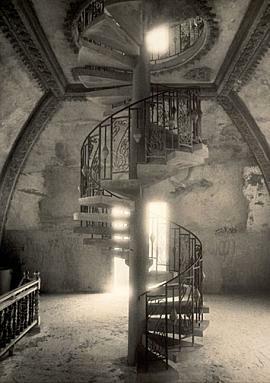
Spiral Staircase
Vientiane, Laos
John McDermott
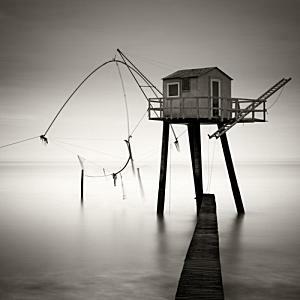
Nowhere Michel Rajkovic
1 2
via riley dog
_______________________
The Mineral Spa, Watrous, Saskatchewan
Jeanette Lynes
Salt loves everything save eyes, keep the eyes out of it.
In this element you are: jingle, skiff, chaff.
Two intelligent women float nearby.
Buoyancy makes strange things fly from your mouth –
families are postmodern – everyone has her version & there’s no center.
They see what you mean. Conversation flows with no bones
weighing anyone down.
Later, dark pennants
of cranes moil over
the saline lake.
Back in your cumbrous marrow shanty though
never home
you admit a truth, there’s only one
version, yours.
Poems
Jeanette Lynes
Canadian Strange
Drunken Boat | 8 | 2006 Edition
4 Poems by Jeanette LynesThis Magazine
12 or 20 questions: with Jeanette Lynes
rob mclennan
_______________________
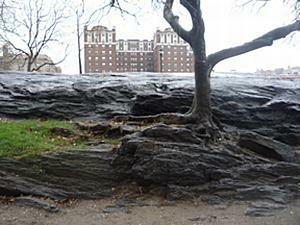
Joyce Kilmer Park
Tree Museum
a public art project by Katie Holten
Bronx, NY
Katie Holten created the TREE MUSEUM to celebrate the communities and ecosystems along the Grand Concourse, a 100 year-old boulevard in The Bronx. Visitors will be able to listen in on local stories and the intimate lives of trees offered by current and former residents: from beekeepers to rappers, historians to gardeners, school kids to politicians.
The Tree MuseumNicola Twilley on Katie Holten's project BLDGBLOG
A Museum of Trees That Speak of History
Jim Dwyer _______________________
from One Thousand One-Second Stories
Taruho Inagaki
Translated from the Japanese by Tricia Vita
EXPLORINGfictions
On Eating a Star
One evening a whitish substance was falling onto the veranda When I put it in my mouth it had a cool milky flavor I was wondering what it could be when all of a sudden I was shoved down onto the pavement Just then a starlike object flew out of mouth dragged its tail over the rooftops and disappeared without a trace
When I picked myself up from the pavement a yellow window was laughing with scorn in the moonlight
An Incident at the Concert
The North Star Fantasy Concerto was getting underway when yellow smoke whirled up with a clap from the center of the orchestra It spread throughout the hall
At the entrance the ticket-takers panicked and opened every window in sight intent upon clearing the air When the smoke was indeed gone the orchestra as well as the audience was nowhere to be seen In the enormous hall only a radiant spray of light was pouring down
Just what happened? Since the people who'd come to the concert hall had vanished for no apparent reason this mystery was perhaps an effect at nightfall probably as a result of the sky being crammed with stardust or so went the generally accepted explanation
...(more)
_______________________
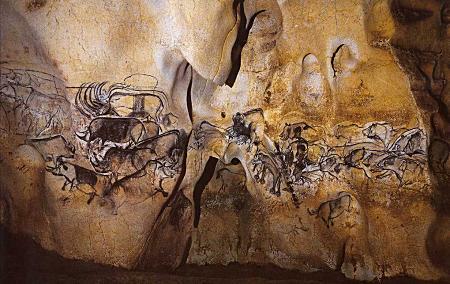
Chauvet panorama
_______________________
Representation, Technology and Society Before Lascaux
Randall White
The shockingly ancient dates recently obtained for the paintings of the Grotte Chauvet have focused new attention on the often ignored cultural developments of early Upper Paleolithic, the 20,000 or so years between the first traces of symbolic representation (ca. 40,000 years ago) and the painting of Lascaux (ca. 17,000 years ago). This long stretch of cultural evolution, comprised of two archaeological cultures, the Aurignacian (40-28,000 years ago) and the Gravettian (28-22,000 years ago), has yielded an abundance of representational objects and images.(....)
Given what preceded the painting of Lascaux 17,500 years ago, we should not be particularly surprised to find a complex technological underpinning to the creation of this remarkable site. A wooden scaffold was constructed at Lascaux to provide access to the walls. In addition, recent research by Pamela Vandiver of the Smithsonian Institution reveals that most of the colors used on the walls at Lascaux had been artificially created by heating naturally occurring clay minerals (especially ocher) to temperatures of 1000 degrees Celsius; once again, an example of symbolic necessity being the mother of technological invention.
The commitment of labor and technological innovation and creativity to symbolic ends implies a fundamental adaptive and evolutionary role for early symbolic representation. "Art," far from being merely a spare-time diversion served a number of critical social and technological functions in Cro-Magnon cultures of the last Ice Age. Two- and three-dimensional representation was an invention, and like all inventions it had to be coherent with and useful to its cultural and historical context in order to be adopted. I presume that, on several occasions prior to the Upper Paleolithic, the ability to use lines and materials to represent natural objects was recognized and perhaps even accomplished in isolated instances....(more)
_______________________
decasia: critique of academic culture
Eli Thorkelson
via Anne Galloway
Space and Culture
_______________________
first issue - The Garneau Review
a pdf Edmonton poetry journal
via rob mclennan
_______________________
A simple fruit Romans picked wild to cure melancholy, the strawberry has become a symbol of both human ingenuity and recklessness.
- Catherine Porter, A strawberry's journey

photo - mw
Purdon Conservation Area
home to 16,000 Lady's Slipper Orchids
_______________________
Forests I have Loved
Shelley Powers
... the real magic in this simple land is to walk the same path in all seasons
_______________________
Madrigal
I inherited a dark wood where I seldom go. But a day will come when the dead and the living trade places. The wood will be set in motion. We are not without hope. The most serious crimes will remain unsolved in spite of the efforts of many policemen. In the same way there is somewhere in our lives a great unsolved love. I inherited a dark wood, but today I’m walking in the other wood, the light one. All the living creatures that sing, wriggle, wag, and crawl! It’s spring and the air is very strong. I have graduated from the university of oblivion and am as empty-handed as the shirt on the clothesline.
- Tomas Tranströmer, from The Living and the Dead
quoted by Dave Bonta (via negativa) in his review Poet in the forest: Tomas Tranströmer
_______________________
Anchor in the Shadows
Bill Coyle reviews The Great Enigma: New Collected Poems by Tomas Tranströmer, translated by Robin Fulton. New Directions Books, 2006.
In Poetic Diction, Owen Barfield defined the appreciation of poetry as an activity that produces “a felt change in consciousness,” and it is just such a change that Tranströmer, through his metaphorical readings of the world, produces time and again in the reader. He is not often compared with James Merrill—in fact, he may never have been, in many ways the two are as different as can be—but I can think of no other post-war American poet who can match him in this regard. To read him is to gain access to the world in a richer, more profound way, to be admitted, as he once put it, “to the real celebration, quiet as death.”...(more)
via Scott Esposito
Conversational Reading
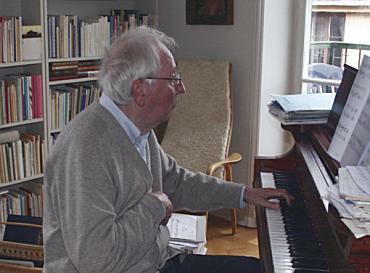
Tomas Tranströmer
Grief Gondola, #2
Tomas Tranströmer
(translated by Malena Mörling)
I
Two old men, father-in-law and son-in-law, Liszt and Wagner,
are staying on the Grande Canal
together with the restless woman who is married to King Midas
he who turns everything he touches into Wagner.
The green chill of the sea pushes up through the palace floors.
Wagner is a marked man, the well known Caspar profile is more tired than before
his face a white flag.
The gondola is heavily laden with their lives,
two round trips and one one-way.
II
A window in the palace blows open, they grimace in the sudden draught.
Outside on the water, the garbage gondola appears, paddled
by two one-oared bandits.
Liszt has composed a few chords so heavy they ought to be sent
to the mineralogical institute in Padua for analysis.
Meteorites!
Too heavy to rest, they are able only to sink and sink through the future
all the way down to the year of the brownshirts.
The gondola is heavily laden with the huddled stones of the future.
III
Openings toward 1990.
March 25: Worry about Lithuania.
Dreamt I visited a large hospital.
No staff. Everyone was a patient.
In the same dream a newborn girl
who spoke in complete sentences.
...(more)
.....................................................
Tomas Tranströmer at The Poetry Foundation
Tomas Tranströmer at Poetry International Web _______________________

photo - mw
_______________________
Kierkegaard's "Mystery Of Unrighteousness" In The Information Age
Brian T. Prosser and Andrew Ward
"The world's fundamental misfortune," the 19th century Søren Kierkegaard writes, "is ...the fact that with each great discovery ...the human race is enveloped ... in a miasma of thoughts, emotions, moods, even conclusions and intentions, which are nobody's, which belong to none and yet to all." The great discoveries to which Kierkegaard is referring are made possible by the use of technology, and part of his concern is that the use of technology often results in human beings having "destitute" relations to one another. As exemplified for Kierkegaard by the popular press, the uses of technologies not only transform face-to-face relationships, they create masks behind which people hide from one another. It is this latter point that is especially important. For Kierkegaard, what ultimately drives people toward certain technological practices is fear. "What rules the world," Kierkegaard writes, "is... the fear of humanity. Therefore this fear of being an individual and this proneness to hide under one abstraction or another.... Ultimately an abstraction is related to fantasy, and fantasy becomes an enormous power... [T]he human race became afraid of itself, fosters the fantastic, and then trembles before it." The use of technology to mediate communication, claims Kierkegaard, provides people with the means to escape, or at least hide from those aspects of interpersonal relationships they most fear.
This tendency to "hide" behind the impersonal masks provided by technologically mediated communication reflects, for Kierkegaard, a flawed attitude regarding what is most essential to veracious communication practices. The attitude is one that he claims characterizes an age "which reckons as wisdom that which is truly the mystery of unrighteousness, viz. that one need not inquire about the communicator, but only about the communication, the objective only". Such an approach to the communication process, one that displaces the communicator from his or her place of centrality, undermines an appropriate sense of what it means to participate in such processes. Accordingly, an impersonal means of communication transforms the sense of ownership in the information being exchanged - that is, it transforms our sense of authorship. As Kierkegaard writes:
... in our age what is an author? An author is often only an x, even when his name is signed, something quite impersonal, which addresses itself abstractly, by the aid of printing, to thousands and thousands, while remaining itself unseen and unknown, living a life as hidden, as anonymous, as it is possible for a life to be, in order, presumably, not to reveal the too obvious and striking contradiction between the prodigious means of communication employed and the fact that the author is only a single individual - perhaps also for fear of the control which in practical life must always be exercised over everyone who wishes to teach others, to see whether his personal existence comports with his communication....
Although the prose may be somewhat oblique, Kierkegaard is making two important, interrelated points. The first is that traditional face-to-face encounters between individuals structure the dynamics of communication in ways that permit the possibility of genuine human relationships. For instance, face-to-face communications often permit the immediate and dynamic clarification of the appropriateness of a particular piece of information. Moreover, the contexts of face-to-face communications generally impose a stronger concern for the veracity of information and instil in the participants a greater sense of responsibility both for what is communicated and how it is communicated. For Kierkegaard such elements are essential to our most "important" and characteristically human experiences. Kierkegaard's second point is that humans are often fearful of their own individuality as revealed in such exchanges. For this reason people seek to change the dynamics of such exchanges so as to hide that part of themselves they fear to reveal. Thus, a principal motivation for the development of technology is largely negative; the use of technology to mediate communication permits a kind of interaction in which the participants can hide or mask their individuality. It is in this respect that the use of technology to hide or mask individuality represents, for Kierkegaard, a fear of, and an attempt to flee from what it is that is most important and characteristic of our own humanity. As Kierkegaard writes:
The highest triumph of all errors is to acquire an impersonal means of communication and then anonymity.... [A]ll true communication is personal.... But error is always impersonal.... Without the daily press and without anonymity, there is still always consolation that there will be a definite, flesh-and-blood individual person who voices the error.... But it is frightful that someone who is no one (consequently has no responsibility) can set any error into circulation with no thought of responsibility and with the aid of this dreadful disproportional means of communication.... ...(more)
_______________________
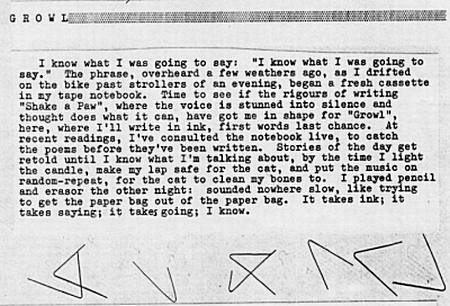
GROWL
Gerry Gilbert
Poetries of Canada
The East Village Poetry Web
farewell to Gerry Gilbert 1936-2009
Peter Culley
Whatever literary community I've ever been a serious part of had him at its center. (....)
Both men (David Bromige and Gerry Gilbert) had bright, translucent eyes & used a lot of neat quick motions to both do & describe things & their exchanges had a musical, bantering, ping-pong lightness to them, a quality I used to call "zen", but with their neat beards & underlying toughness of wit it could sometimes be a bit Jacobean too......(more)
On, The Way To Gerry Gilbert's Moby Jane Through "Picture Windshield"
Robert Thompson studies in Canadian literature
The wor[l]d, that is, what's here (and now), is big. It's full of stuff, of stuff acting--it's apparent the moment you open Gerry Gilbert's Moby Jane, also the moment you close it. There are no neat packages in Gilbert's work, or, said more accurately, if there are, they exist only within a larger context which undercuts/scores both the package and its neatness. As Gilbert says in an interview with Barry McKinnon, "a lot of the writing that we do is done in context. Like, you wrote a book and there was maybe only one literary passage in it, but it needs all the rest or otherwise it's not there--Real books rather than fake books" (McKinnon 67). What you get from Gilbert, is what you get. What I get may, or may not be, something similar. The point is that we're getting something when we open up his book, and what we're getting is intimately involved with what we're doing--where we are--the "real." Like Gilbert's writing, our reading is going to change if we open up his book on a bus, in a cafe, after drinking, while drinking--where we open it up--both in terms of what just preceded, and the specific page. In the end, the reading and writing are interchangeable, all part of a continuum that we're all a part of: "it seems to be me writing / actually it's you reading" ("Spit Tax").
The continuum that we're all a part of is life, and is language. In his book From Next Spring Gilbert says:
. . . life is absolutely delightful, a crushing interruption I've learned to count on. Most writers progressively make more sense as they work life and the result is life looks like an out strip mine, all mine --my progression is no less than theirs (& we're all doing magnificently, as we'll see next spring) getting better & better the more we bet-- the sense of my writing is incidental, it is the incidental itself, the tooth, the worms way from the inside of life to the surface. A path which opens at the heart of the house, where we're wearing the sky and having a cup of tea. You look down at us and the first thing we do with your surprise at the end of a perfect day is put on the kettle against the hot belief that anything we'd write or say is itself the sense that life makes. (From Next Spring 27)
For Gilbert, life is going, diachronic, moving, not fixed, made up of things and things happening, "incidents" which are "incidental" to one another, which are "incidental" to the poem, to the writing (reading), to the whole damn work(s). "Incidental music" is music played in connection with the presentation of a play, motion picture, poem, etc. It's the "kettle,"
it's not cream
it's an edible oil product
they're not jeans
they're an incredible denim sausage
leg-up, mother blonde
yes, you look like tina turner
[and Gilbert) can't take [his] pen offa you.
-
(Moby Jane 253)
It all works "against the belief that anything that we'd write or say is itself the sense that life makes." Like the slugs in his poems, Gilbert leaves his mark as he passes, gets underfoot, makes you look where you're going, goes as far as he can.
. . . It's their sense of time & power equals speed that I'm trying to derail . . . and that's not some crazy weird stoned reflex of mine, it's my view of myself in the situation, I keep looking so I wont vanish into the tube. They are scared to look, which is scary, that the people who claim to own the world are running on fear. Be brave me hearties! Let me show you what fear is! Watch me dance! Muscles are springs -- I gotta spring in my step! I get to know what I watch: the best! I've got a sense of history--and here's some good advice: the only material you can make history out of is honesty. Honesty is judging time in terms of space, and not the other way around. The other way around, time (the money, the lie, the makeup) is the death of space. I'll go the distance. Because, like a slug, I'm always right there. In the way, On the way. Speed for me is how far I can see. From here. You should see me really go. Honestly (From Next Spring 187-88) ...(more)
Moby Jane Gerry Gilbert google books_______________________

photo - mw
_______________________
from
Loneliness
Tomas Transtromer
translated by Robin Fulton
II.
I have been walking for a long time
on the frozen Ostergotland fields.
I have not seen a single person.
In other parts of the world
there are people who are born, live and die
in a perpetual crowd.
To be always visible---to live
in a swarm of eyes---
a special expression must develop.
Face coated with clay.
The murmuring rises and falls
while they divide up among themselves
the sky, the shadows, the sand grains.
I must be alone
ten minutes in the morning
and ten minutes in the evening.
---Without a program.
Everyone is queuing for everyone else.
Many.
One.
...(more)
Meeting of mindsRobin Robertson on Tomas Tranströmer guardian
The landscape of Tranströmer's poetry has remained constant during his 50-year career: the jagged coastland of his native Sweden, with its dark spruce and pine forests, sudden light and sudden storm, restless seas and endless winters, is mirrored by his direct, plain-speaking style and arresting, unforgettable images. Sometimes referred to as a "buzzard poet", Tranströmer seems to hang over this landscape with a gimlet eye that sees the world with an almost mystical precision. A view that first appeared open and featureless now holds an anxiety of detail; the voice that first sounded spare and simple now seems subtle, shrewd and thrillingly intimate. There is a profoundly spiritual element in Tranströmer's vision, though not a conventionally religious one. He is interested in polarities and how we respond, as humans, to finding ourselves at pivotal points, at the fulcrum of a moment:
The sun is scorching. The plane comes in low,
throwing a shadow in the shape of a giant cross, rushing over the ground.
A man crouches over something in the field.
The shadow reaches him.
For a split-second he is in the middle of the cross.
I have seen the cross that hangs from cool church arches.
Sometimes it seems like a snapshot of frenzy.
("Out in the Open")
Tranströmer's is a poetry of sharp contrast and duality - a double world of dark and light, inside and outside, dreaming and waking, man and machine, stillness and turmoil - and he is fascinated by the pressure between the world we know and the hidden world we cannot deny....(more)
_______________________

photo - mw
_______________________
Haiku
Tomas Tranströmer
Translated by Robert Archambeau and Lars-Håkan Svensson
Samizdat Magazine
V
The sea is a wall.
I hear the gulls crying –
they’re waving to us.
God’s wind at my back.
The shot which comes without sound –
a dream all-too-long.
Ash-colored silence.
The blue giant passes.
Cool breeze from the sea.
I have been there –
and on a whitewashed wall
the flies are gathering.
Birdmen.
The apple trees in blossom.
The big enigma.
...(more)
Two Poems from Tomas Tranströmer
translated by Robin Fulton _______________________

photo - mw
_______________________
Historiographic poetics is a response to the question what one might do in order to listen and talk with ghosts.
Remembrance As Praxis And The Ethics Of The Inter-Human
Roger I. Simon, Mario DiPaolantonio, Mark Clamen culture machine
In his essay ‘The Storyteller,’ Walter Benjamin referred to counsel as, ‘less an answer to a question than a proposal concerning the continuation of a story which is just unfolding.’ For Benjamin, in order to seek and receive counsel one would first have to be able to tell this unfolding story. On such terms, for the lives of others to truly matter - beyond what they demand in the way of an immediate, necessary practical solidarity - they must be encountered as counsel. These would be stories that might actually initiate a de-phasing, a potential shifting of our own unfolding stories, particularly in ways that might be unanticipated and not easily accepted. Benjamin was attempting in this essay to reflect on the erosion of the very possibility of the exchange of experience. For him, this was actually being prevented by the proliferation of news reports and mass dissemination of stories and images that accompanied the media meditated transmission of experiences. Benjamin thought the link between memory and experience was being threatened within what he termed a ‘phantasmagoric’ flow of information that resulted in an age well informed about itself but at the same time knowing very little. Missing was the ‘wisdom’ of experience, its non-indifference, its transitivity. That is, the possibility that the telling of a story would actually make a difference in the way one’s own stories were told, either by opening one’s existing narratives to assessment and revision or by influencing one’s actions. This inability to ‘experience’ the transitivity of the stories of others (something other than simply being able to read/hear and recount them) is an historical condition. And it is to the conceptualization of this condition that we now wish to turn....(more)
The Storyteller [pdf]
Reflections on the Works of Nikolai Leskov
Walter Benjamin

Democritus in Meditation
Salvator Rosa
b. 20 June 1615
45 The universe is infinite because it has not been produced by a creator. The causes of what now exists had no beginning.
46 There is an infinite number of worlds of different sizes: some are larger than ours, some have no sun or moon, others have suns or moons that are bigger than ours. Some have many suns and moons. Worlds are spaced at differing distances from each other; in some parts of the universe there are more worlds, in other parts fewer. In some areas they are growing, in other parts, decreasing. They are destroyed by collision with one another. There are some worlds with no living creatures, plants, or moisture.
47 The material cause of all things that exist is the coming together of atoms and void. Atoms are too small to be perceived by the senses. They are eternal and have many different shapes, and they can cluster together to create things that are perceivable. Differences in shape, arrangement, and position of atoms produce different things. By aggregation they provide bulky objects that we can perceive with our sight and other senses.
48 We see changes in things because of the rearrangement of atoms, but atoms themselves are eternal. Words such as ‘nothing’, ‘the void’, and ‘the infinite’ describe space. Individual atoms are describable as ‘not nothing’, ‘being’, and ‘the compact’. There is no void in atoms, so they cannot be divided. I hold the same view as Leucippus regarding atoms and space: atoms are always in motion in space.
Democritus
_______________________
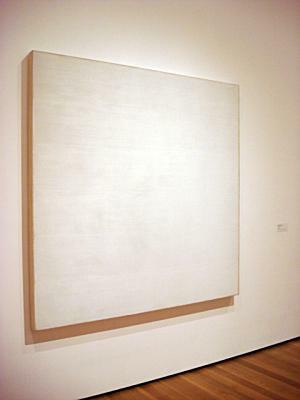
Twin (MoMA - New York)
Robert Ryman
photo - scalleja
flickr
.....................................................
Whiting On the Wall
Arthur C. Danto on Robert Ryman
Suzanne P. Hudson’s Robert Ryman: Used Paint is the first book-length study of the artist’s achievement, and it comes with an interesting thesis, namely that his paintings exemplify what the author calls “embodied thinking,” which I interpret to mean that his paintings are not the product of thought, but thought itself. Seeing how the paint works is only part of the process: “For Ryman, the painted sign, the support on which it is put down, the edge that rims it and connects it to the wall, and the wall that finally completes the circuit” must all be taken into account when describing what one of his paintings is. Hudson has, accordingly, divided her study into five chapters: “Primer,” “Paint,” Support,” “Edge,” and “Wall.” Beyond that, she undertakes to explain Ryman’s practice from the perspective of pragmatism, and especially John Dewey’s version of it, which “markedly influenced moma’s early ‘laboratory’ years”:
At the most basic level, my positioning of Ryman as a pragmatist means that Ryman’s painting remains for him a perpetual experiment and that each painting is the upshot of his trials. What a painting is is commensurate with what a painting does so that ideas are hypotheses to be tested and revised against the consequences, in painting, that they have produced....(more)
_______________________
I know the expression “the death of painting” has become journalistic shorthand, but, as poet, I still feel threatened.
Poets and PaintersMartin Earl
Painters and poets have been wed from the beginning. Language itself has pictorial roots. The best know examples date back 17,000 years to the cave paintings in Lascaux and elsewhere. And yet the first representational art was found near Schelklingen in Germany and dates back the to beginnings of the Upper Paleolithic period, 35, to 40,000 years ago. It was out of this Aurignacian culture that the first cave art develops. From these drawings eventually (over a period of twenty thousand odd years…an unimaginable number, really; it almost makes us seem contemporaries of what we refer to as the Classical World) came pictograms, symbols still based on seen forms, but simplified and standardized, used to represent objects (and used today, in fact, in places where different language groups cross – cities, train stations, traffic signs – making sure we walk into the correct bathrooms). This was a kind of proto-writing still based in copying the shapes of nature. The development of writing followed a path of gradual abstraction; out of pictograms come ideograms, which represented ideas instead of objects. The rebus principle allowed the pictogram to represent the sound of a syllable pushing pictograms toward phonograms. Only Chinese and Japanese preserve the their logographic origins. Rebus writing was already part of Egyptian culture by 340 BCE, whence modern alphabets began to form.
Poets are attracted to the symbolic and pictographic traces of their own language in painting. For poets, painting is full of atavistic vocabularies. Painters, on the other hand, have always looked to poets to articulate what we might call their sublime backwardness. It is curious that the language of painting reached its most sophisticated moment, its representational apogee, in the late Renaissance and Baroque and only discovered a new language through a gradual loosening of the nearly photographic rigor of such artists as Vermeer and Dürer. The early Baroque painter Caravaggio preserved an exacting realism but upped the fever pitch, adding a dramatic tension that went beyond Renaissance composure. Like Rembrandt before him, with his almost psychoanalytic insistence on the self-portrait, Beethoven was already in departure mode. Große Fugue is the death rattle of the classical style. Arnold Schoenberg’s “Verklarte Nacht” is full of Beethoven’s late quartets....(more)
_______________________
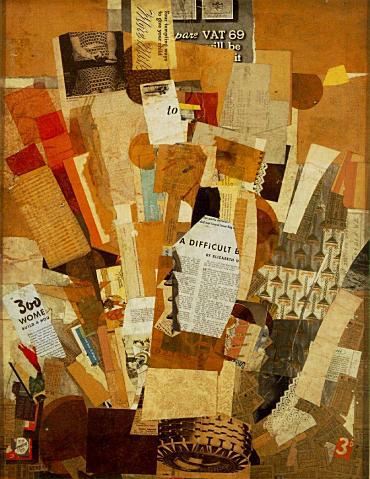
Kurt Schwitters
b. 20 June 1887 133 images
Kurt Schwitters' Merzbau: The Desiring House
Jaleh Mansoor
Invisible Culture
While Schwitters never exchanged the paint, canvas, or brush for photography or the readymade, or any other form related to modernity, industrialization, and mass reception (forms with which other avant-gardists were struggling), he nonetheless stripped those traditional tools of their purity and integrity. By crossing them with the very materials and processes they were meant to transcend—the organic, the industrial—he inaugurates a practice unbounded by object category or classification, what Deleuze would identify as a kind of “anorganic vitalism.” What is at stake is a particular self-driven economy of work indifferent to its product. This is already evident in Schwitters’s collage work of the early and mid teens, the Merzbilder. To think of the Merzbau in terms of architecture would shift the focus onto questions of architectural specificity and its limits, thereby obscuring the problem at hand: the centrality of a process undetermined by ends, objects or products. A comparison of the economy driving Schwitters’s collage production to that of Picasso’s cubist collage presents the problem more clearly.
“I am a painter and I nail my pictures together.” In a 1924 issue of Merz, entitled G, Schwitters discussed poetry and painting together:
The end pursued by poetry is pursued, logically, by Dadaist painters who, in their pictures, evaluate object against object by sticking or nailing them down side by side. Things may be evaluated in this way rather than they are when signified by words.
Here, the dyadic and vertical relationship between the material signifier and the signified is exchanged for a laterally oriented cutting and dividing of a particular signifying chain in conjunction with equally horizontal and incommensurable chains. In other words, in Schwitter’s system, poetry’s logical conclusion is painting. And, in a step counter to either Modernism or Dadaism, painting’s logical conclusion is the process of assemblage: the cutting, nailing and sticking together of objects. Language (poetry) and matter (the pictorial surface and paint) become mutually interchangeable as though they shared a common denominator otherwise hidden from aesthetic understanding. The specificity or integrity of any one medium is exchanged for the mutable space of production, the production of production itself. Language and materiality meet on another register: an imminent fabric of relations determined by cutting and connecting, production and passage. Each disciplinary practice (painting, poetry, labor) is cut, redirected and woven together along the common circuit of process: the nailing and affixing that cuts a material (including language in its material vocal and textual aggregation) and assure its flow and connection to an other material or language.
A question nevertheless remains. If Schwitters insists on transverse or transfinite connections and interruptions in a field of composition and decomposition, where do Schwitters’ practices meet? How can one, looking back on Merz, trace the generative logic or motivation, the gravity of its build-up of work?...(more)
Kurt Schwitters, Master Collagist
A Retrospective, 1918- 1947
The Merzbarn Project And Kurt Schwitters In England
Schwitters at Dave Palmer's cut & paste: the history of photomontage
_______________________
Beginning the Merzbau
line plane
circle orb
in the round
all is flat
intersecting planes
On one Charlie Chaplin twitches his moustache,
on another Mussolini shakes his fist,
and here Anna Bloom
wears every woman's face in turn.
My glue pot heating on the stove
smells like the cabbage of paradise.
(A lyric poem's no railway schedule).
I stir lumps out of the plaster
then trowel on pure forgetfulness.
(Retain as proof of purchase).
With scissors I cut out the walls of paradise,
facet them into a gem at the centre
of the grotto of longing.
Anna Bloom changing her lingerie --
with my trowel I colour it white.
The Merzbook: Kurt Schwitters Poems
Colin Morton
... narrative poem loosely based on the life and art of the renowned modern German collage artist, Kurt Schwitters.
_______________________
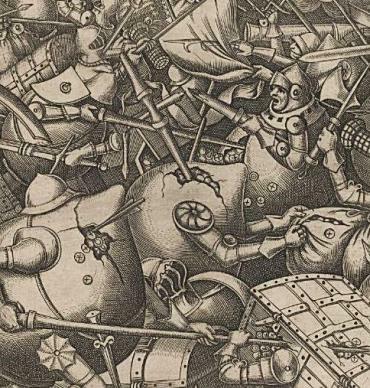
Fight of the Money-Bags and the Coffers
detail
Pieter van der Heyden
(fl. 1557) Coin and conscience
popular views of money, credit and speculation
Baker Library | Bloomberg Center, Historical Collections
_______________________
The way we talk
Cecil Helman
The way we talk on the telephone. Yes, the liquid flow of her melodious voice. So special. Warm and harmonious, and usually quite low. Her voice like hot treacle through the telephone, dark now yet sweet. Late at nighttime, or early the next morning. She talks and talks. Afterwards, it’s always the same. The skin of my ear raw and blistered. That half of my face peeling to the touch, and flaking away. The telephone set, all cracked and corroded. And always that same sweet incense of burning plastic. So special. And the droplets of melted phone, black and tiny like musical notes strewn across the carpet. We need to talk, she says. And talks. And again. Like heated tar through the telephone now, hot and viscous. The smell of melting wires, again. Yesterday, our talk singed my hair. Again. But today, for the first time, it set the curtains alight. The cat ran screaming from the room, her fur scalded by the conversation. In their bowl, the goldfish boiled. Several house-plants wilted in the heat, others died. Someone called the fire brigade. Someone else jumped out of the window. Tomorrow morning, I guess we will talk again. In the meantime, the telephone company has complained. Their fuses have blown, they say, and their fibre-optics are all aflame. Our city is now cut off from the others, our country no longer in touch with the outside world. High above us, their telecommunication satellites fall flaming from the sky. Droplets of melted tungsten and burning steel dropped through the ether: slowly, melodiously, like the words of a leisurely conversation. Her voice is dropping too. Now it comes from the deeper down. Much deeper. Deep below the earth’s surface, but rising fast. Hot, molten, incandescent lava pours out of the telephone as we talk. Down the slopes of Mount Etna, and into my sitting room. It’s completely on fire now, and so is the house itself. Smoke signals rise into the flaming sky. Higher and higher, among the falling satellites. All around me I can catch that familiar smell of burning flesh. Yet again. But we need to talk, she says. They’re so very special, these talks we have. I put down the melted phone, onto the charred remains of the little table. Everywhere cylinders, and charcoal, and piles of ash. And tomorrow? Tomorrow, I am sure, we will talk again. And again —
Cecil Helman at Poetry International Web
Tribute to Dr Cecil Helman
1944–2009
_______________________

photo - mw
_______________________
The New World pdf
Tom Clark
Eruptions of starlight, joy and gladness
As, at 10:30 p.m. on Shattuck, the New
World dawns with shouts of "Yes we can!"
From young persons thronging the clogged street.
The street people, however, are just trying
To get some sleep. I infer this from the body-
Bundles I see huddled in every alcove. But why,
In the rapture of intoxicated victory
I glimpse around me, do I insist on this
Dissonant note? "A complete curmudgeon,"
Gentle Dorothy once called me, in
Exasperation, accurately,
I cannot deny. Aye, O Friend! I fear there are
What are lately called Depression Issues
At work here. How tiresome, really.
By Depression do I mean the mental kind
And am I signalling I "need help"? Some,
I'm told, might well secretly think so.
"And maybe they're right, William," tenders
Gentle Dorothy from across the hearthside.
The nights are growing sharp, November
In the Cumberlands, ancient aching joints,
Getting up in the dark and seeing your breath,
Bad patches of thatch to fix before frost
Closes in and fingers, too numb for labors,
Withdrawn into religious half-mittens.
There were street people in William's village
Too. But in knowable communities
That which is often seen soon becomes known,
Thus accepted and not stepped over
As if inhuman, insignificant
Or nonexistent. Naturally William,
Who saw the poetry in everything,
Perceived the poetic aspect of this--
Particularly after coming back from
London, where the bewildering urban
Alienation and estrangement
Had already long since taken hold.
Awed have I been by strolling Bedlamites,
He writes in Book XII of The Prelude,
Referring to the road-wandering not-
Quite-normals of that not-so-remote epoch,
From many other uncouth Vagrants pass'd
In fear, have walk'd with quicker step; but why
Take note of this? When I began to inquire,
To watch and question those I met, and held
Familiar talk with them, the lonely roads
Were school to me in which I daily read
With most delight the passions of mankind,
There saw into the depth of human souls,
Souls that appear to have no depth at all
To vulgar eyes. I like that. To me it feels
More considerate toward the Bedlamites
Than the shrieking street partygoers
To the street people trying to sleep this night
Of victory through, unnoticing. ...
...(more PDF)
Big Bridge
Slow Poetry: An Introduction, Edited by Dale Smith
via K. Silem Mohammad
_______________________

Revolving
Kurt Schwitters
1919
_______________________
List of Summer Reading Lists
Rebecca Blood
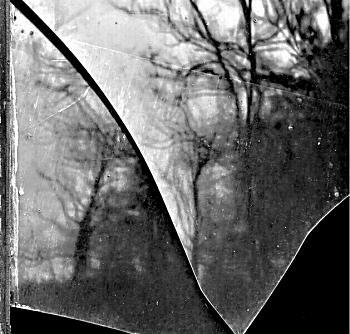
Entropic Melodies
Andy Ilachinski
Tao of Photography
_______________________
A summer evening’s slight conceptualness
Ilpo Tiihonen
Translated by Herbert Lomas (assisted by Soila Lehtonen)
Books from Finland
Ah summer evening, and its eveningness,
its prodigious wonders and their bridgefulness
when the nightunited seamlessness
steals into one’s heart with restfulness
O heiferiness and humanness,
ah shivering shimmeringness,
innocents’ innocuousness
and vastness with its stresslessness —
five or six chicks of a dabchick,
and deep water, lapfulness.
Our blue sky’s mirrored changefulness!
the spruces’ tall topliness, their tips’ sacredness
the yellow-billed black singer’s flutiness.
Nested cosiness, mutual tootiness!
And oh the idler’s idling idleness
and the shuttling rower’s glidingness
on his holiday trip to goal-lessness
the fisherman’s undemanding uncatchingness
the innocent non-offendingness
of the leadhead’s letting-go-ingness.
Summer, great echoing summer’s heatstrokiness,
the haiku-puffs of the sauna’s smokiness, lip-lap
unsteady jettiness, lip-lap, rocking-about-edness
the naked skin’s nothing-about-it-edness
aerial echoing of seagulness
and goodies grilling for forkedness.
Ah gulfiness, lakiness, streaminess
ah featherlight set-free-again-ness
and seismic earth’s ecstatic staticness
and summer calm’s so easy boatliness.
...(more)
_______________________
OED
Prefaces to the First Edition Fascicles (1884-1928)
... the prefatory material that was published with the 125 fascicles, and the cumulated sections, parts, and volumes, in which the OED was originally issued between 1884 and 1928. These were collected in 1987 by Darrell R. Raymond of the University of Waterloo, and republished as Dispatches from the Front. This invaluable collection also contains useful tabulations showing numbers of entries in the different sections, and is reproduced here with gratitude for all the help he has rendered the OED Online project.via ResourceShelf
_______________________
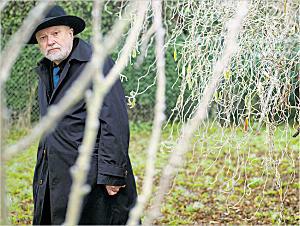
Geoffrey Hill
photo - nyt
On Reading Crowds and Power
Geoffrey Hill
1
Cloven, we are incorporate, our wounds
simple but mysterious. We have
some wherewithal to bide our time on earth.
Endurance is fantastic; ambulances
battling at intersections, the city
intolerably en fête. My reflexes
are words themselves rather than standard
flexures of civil power. In all of this
Cassiopeia's a blessing
as is steady Orion beloved of poets.
Quotidian natures ours for the time being
I do not know
how we should be absolved or what is fate.
2
Fame is not fastidious about the lips
which spread it. So long as there are mouths
to reiterate the one name it does not
matter whose they are.
The fact that to the seeker after fame
they are indistinguishable from each other
and are all counted as equal shows that this
passion has its origin in the experience
of crowd manipulation. Names collect
their own crowds. They are greedy, live their own
separate lives, hardly at all connected
with the real natures of the men who bear them.
3
But hear this: that which is difficult
preserves democracy; you pay respect
to the intelligence of the citizen.
Basics are not condescension. Some
tyrants make great patrons. Let us observe
this and pass on. Certain directives
parody at your own risk. Tread lightly
with personal dignity and public image.
Safeguard the image of the common man.
Geoffrey Hill : The Poetry Foundation
The orchards of Syon
Geoffrey Hill google books
The Triumph of Love
Geoffrey Hill
google books
_______________________

Whoever Reads Bourgeois Newspapers
Becomes Blind and Deaf:
Away with These Stultifying Bandages!
John Heartfield
1930
Agitated Images
John Heartfield & German Photomontage, 1920–1938
Heartfield's Art
john heartfield : dada + beyond 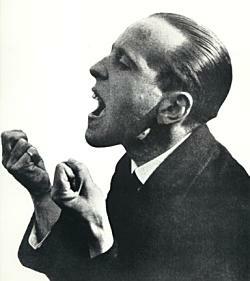
self portrait
John Heartfield
b. June 19, 1891 1 2 3
_______________________
Health media & global inequalities
Hsuan L Hsu, Martha Lincoln
Daedalus , Spring 2009
Public service campaigns deploy mass media to frame health as the responsibUity of individuals and communities. From instructing parents to have their children vaccinated to warning against the risks of illegal drugs, media campaigns provide states and other agents with a means to shape citizens' health behaviors. This "hypodermic" model of education, as media studies scholars term it, presumes that information can be "injected" into passive authences to produce desired changes in attitude or behavior.
Not only the content, but also the narrative and aesthetic features of health communications mediate and impact their reception. These features, in fact, "create a range of publics" and resist association with any idea of a universal "public" to be educated. Public health campaigns, therefore, demand interdisciplinary analysis that combines textual interpretation with research that addresses local and transnational forces that affect the health of populations. We know that discourses about health shape and direct people's experiences of embodiment and subjectivity, their perceptions of risk, and their health behaviors ; so how do educational campaigns that intend to transmit health information across national boundaries affect these experiences ? What kinds of subjectivity are called forth when health information travels?
While epidemiological data confirm the quantitative aspects of global disparities in health, mass-mediated health discourses allow us to study the cultural and political dynamics of these disparities. Two such discourses -Bodies . . . the Exhibition, which displays anatomical specimens produced in China for consumption in wealthy first-world nations, and a comic book produced by international health and human rights agencies to raise HIV/AIDS awareness among young people in the developing world - illustrate the role of global inequality in shaping the production and consumption of health messages. Both are international public health communications complicated by the fact that their materials have originated in locations far removed from the sites of their consumption. Bodies...the Exhibition both leverages and conceals the economic inequalities and health disparities between its sites of production and consumption; the HIV/AIDS comic book campaign attempts to redress global health disparities, but ultimately avoids engaging questions of inequality. These representations of health, bodies, and human rights circulate between developed and underdeveloped nations, overemphasizing universal human qualities and neglecting the critical role of economic and social vulnerability in distributing health disparities unevenly around the globe. ...(more)
Daedalus - Spring 2009
_______________________
A Pattern of (Not Deviation From) Empire
Torture: an American Legacy
Carl Boggs
Torture has always been a staple of U.S. military interventions, built into its very logic of imperial agendas. A nation that has launched warfare dozens of times, repeatedly attacked civilian populations, destroyed entire societies, used weapons of mass destruction, and deployed massive armed force to crush popular movements around the world – killing millions and displacing tens of millions more in the process – could hardly be expected to shy away from smaller-scale criminality in its pursuit of Manifest Destiny....(more)
_______________________
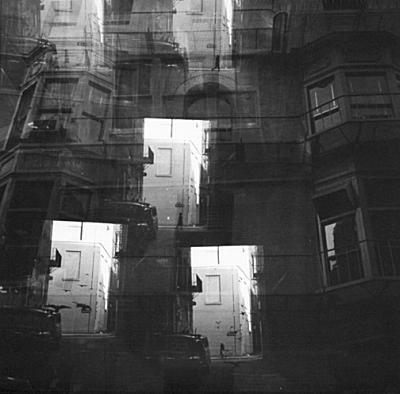 Providence
ca. 1967
Harry Callahan
1912 - 1999
1 2 3 4 5
_______________________
Infrapolitics & the Nomadic Educational Machine
Stevphen Shukaitis
Interactivist Info Exchange
From Randall Amster et al, Eds. (2009) Contemporary Anarchist Studies: An Introduction to Anarchy in the Academy. New York: Routledge.
Anarchism has an ambivalent relationship to the academy. This is, when one takes a second to reflect, not so surprising. How can one maintain any sense of ethical commitment to non-hierarchal, non-exploitative relationships in a space that operates against many of these political ideals? And how to do so without creating a space or knowledge that can be turned against these political goals themselves? As Marc Bousquet and Tiziana Terranova remind us, the institutional setting of the university is not a location outside the workings of the economy (i.e., it is not a bubble nor an ivory tower), but is very much a part of it, existing within the social factory and producing multifarious forms of value creation and the socialization of labor (the development of ‘human capital’ and the ability to brandish forth credentials to obtain employment, practices of knowledge, information, and organization that are used throughout the entire social field). This is the case, broadly speaking, both for the classical university, which played an important role in the process of state building and the creation of national culture, and for the neoliberal university, which is more geared to the development of new forms innovation and creativity. That is to say, of course, innovation and creativity understood primarily as those forms that can be translated into new intellectual property rights, patents, and commodifiable forms of knowledge and skills. Thus, there is no ‘golden age’ of the university that one can refer to or attempt to go back to; it is not a ‘university in ruins’ that can be rebuilt to return to its former glory precisely because it is a space that has always played a role in creating and maintaining questionable forms of power.(....)
The workings of the nomadic educational machine are closer to the operations of a diffuse cultural politics than what would be commonly recognized as an educational project. David Weir makes the intriguing argument that anarchism’s great success as a form of cultural politics (particularly within the spheres of art, music, and in creative fields generally) is because of the inability to realize anarchism’s political goals in other ways. But there is more to it than an inability to realize political goals, particularly when the realization of these goals is almost always understood to be the creation of a hegemonic space or situation, such as replacing a particular territorial nation-state with a newly created anarchist non-state. Rather than seeing the success of anarchist cultural politics as connected to a failure to create hegemonic forms, one can see it rather as based on a continued refusal of institutionalizing forms that contradict the nature of anarchist politics. It is seeing the educational dynamics that exist within the hidden configurations of knowledge production circulating in the undercommons, a process that is just as much about the articulation of ideas through the arts and culture. The nomadic educational machine is a fish that swims in the secret drift of history that connects medieval heresy to punk rock, from Surrealism to Tom Waits; and it is this submerged history from which insurgent movements draw theoretical and imaginal substance and inspiration from, to forge tools and weapons for resistance....(more)
_______________________
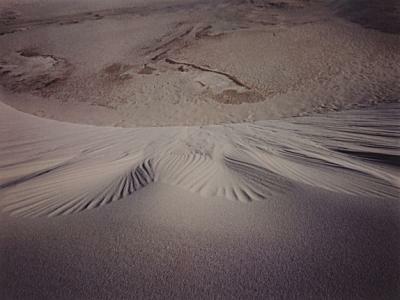 Cape Cod
Harry Callahan
 earthbound
Stephanie Valentin
Stills Gallery via gmtPlus9 (-15)
_______________________
The Weather Within
Theodore Enslin
In Memory
In Homage
George Oppen
1908-1984
out of scale the consciousness
brave instance of its life
flickers
constant
inconstant
make and brake
the engine
evident
by degrees
announces clearing
seasonal.
(....)
A picture from within a
very simple picture --
not that simplicity
is always the answer.
It is necessary that some things
grow complicated and various,
although the roots are simple.
Beginnings are within us.
There, they had best be simple
figures in quick
sure
strokes.
(....)
A fire of small things
opens in the wind
there are spaces
hot
but without color or substance.
They point the way
within to where small things
were greater
-early-
before the fire swept them up.
(...)
Lest any shadow touch the heart
the heart be troubled we would be wet
our feet in moonlight
where the hill and mist joined forces
seamed
a valley seemed there
and a lake
and memories
old stories told by campfires
in the smallest watches of the night.
We knew that much
we tried
to listen and be still
yet
shadows frighten
and the large concerns
which blot out memory
moonlight
the pleasures of the dark.
...(more)
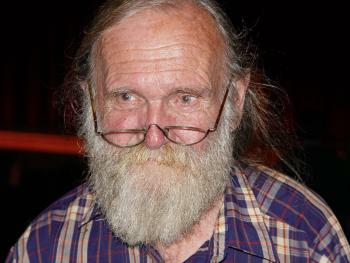
Theodore Enslin
(born March 25, 1925)
Karl Gartung
Niedecker Conference Photos - October 9-11, 2003
Interview with Theodore Enslin
Robert J. Bertholf
conjunctions
If you think harmonically, you think vertically. And you do not really make the connections. If you think contrapuntally, it is a question of voice leading. That is in every part of the composition, not simply the melodic line, but the other contributory lines. You are making the constant progression. I would say that was very difficult for me to assimilate at the beginning. As I became better at it, I was not writing anything I would save, but I began to hear that way. And I think that I do hear that way now. That certainly is very important.
...(more)
Ted Enslin: One Day & How It Was
damn the caesars
Prolific as ever, I pity the fool burdened with the task of compiling a comprehensive bibliography of Ted Enslin's published work. The spontaneous, decentralized nature of small press publishing undoubtedly confounds such a task further. Here one minute, gone the next. Tracking down several dozen small press publications and magazines might be difficult but it is nonetheless possible; tracking down a body of published works comparable to the number pumped out by Enslin would require a Herculean effort. The same is of course true for the corpus of work by Cid Corman, one of the first to publish and promote Enslin's poetry back in the late 50s. Both poets have, in addition to their larger works and poetic sequences, published dozens of slim, seemingly negligible volumes of verse. Many of the books are gorgeous works of art themselves--letter pressed, silk screened, hand sewn, printed on beautiful stock. Coming into such publications is more akin to reading a deeply intimate, private correspondence than a book manufactured by a larger publishing company and shipped out of a warehouse. Like literary correspondence, the slim independently published volumes can not only be read for their own sake but also to broaden & further develop readings of more substantial works by an author. In the case of Enslin, we could, for example, ask how a small volume like One Day might lend itself to a reading of his longer works such as the three volumes of Forms (Elizabeth Press) or the two volumes of Ranger (North Atlantic Books)....(more)
3 sequences from The House Of The Golden WindowsTheodore Enslin Light and Dust Mobile Anthology of Poetry
Theodore Enslin books
_______________________

Edith and Rennie Booher
Danville, Virginia
1970
Emmet Gowin 1 2 3 4
Emmet Gowin interviewed by Sally Gall
BOMB 58/Winter 1997
_______________________
"All that is solid melts into air"
notes on the logic of the global spectacle
Jonathan Flatley
Afterimage, Sept-Oct, 2002
All that is solid melts into air, all that is holy is profaned, and man is at last compelled to face with sober senses, his real conditions of life, and his relations with his kind.
-
Marx and Engels, The Communist Manifesto
In his insistence on liveness, on the necessity of revolution responding to and participating in reality itself, Scott-Heron updates a longstanding Marxist tradition anxious about our ability to represent and thus apprehend historical reality. Without a map of the historical situation in which we find ourselves, how can we possibly develop a plan for changing that reality? Our inability to map out our historical situation is frequently seen as the result of a stubborn melancholic intrusion of the lost past into the present. For example, in The 18th Brumaire Marx famously laments that: "The tradition of all the dead generations weighs like a nightmare on the brains of the living." Just when people seem ready to revolutionize themselves, they "anxiously conjure up the spirits of the past to their service." Thus, they keep betraying themselves because they mis-recognize themselves, their real conditions of existence and their relations with each other. The revolutionary task is to be present to the present--to s ee the world as it is and act accordingly. I take this to be Lenin's suggestion when he remarks that," one can never be radical enough; that is, one must always try to be as radical as reality itself." We are always playing catch-up in relation to reality. There is a persistent time lag that we are always trying to close.(...)
In the second part of the sentence from The Communist Manifesto which I have taken as my epigraph, Marx and Engels assert that the way capitalism constantly denudes and destroys, leaving nothing holy, will allow us to see clearly the nature of class oppression as well as its collective nature: man will be forced to face "his real conditions of life, and his relations with his kind." Now, it is the melting into air of televisuality itself that offers us the possibility for seeing these relations and for seizing them. In fact, it may be the only place in which they can be perceived, It may be that it is not as workers of the world that we will unite, but as a mournful and melancholic audience. Scott-Heron was partly right: the revolution will be live. But for better or for worse, that "liveness" is now available exclusively on television....(more)
_______________________
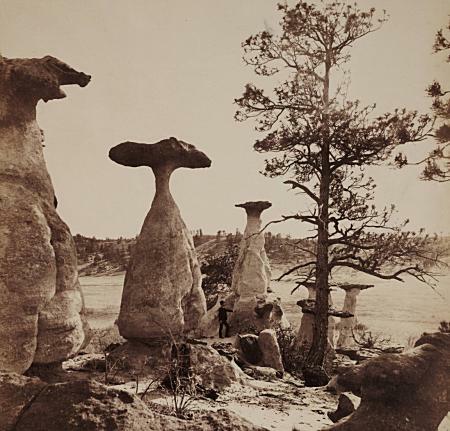
Monument Park
detail
click image for full size
William Henry Jackson
1843-1942 Mammoth Plate Photographs Of The North American West
Beinecke Rare Book and Manuscript Library
via gmtPlus9 (-15)
_______________________
from
To Build A Cathedral
Theodore Enslin
Beard of Bees Publications
Where did time go unanswered
‘The mornings of genius are long’
length is no answer to ask
such a question impossible
none at all
of days there are others
of quality to be accounted
ah the count goes awry
Where did we go in a time
of no limits? answers pose questions
what there is not serious
as is
where and the why
the days and their fragments
miniscule as their length
nothing to measure and of quality
which is is not or in description
what can be expected of genius?
not from its mornings or later
its twilight such length
or dimension
to build a cathedral.
...(more)
Beard of Bees an independent, free press in Chicago, Illinois
_______________________

No Lake This Summer
Jessica Bruah via The Exposure Project
_______________________
The first voice loop was an echo
Beth Staley
jacket
Call my “I”
a shabby container
an hourglass turned
and turned information
coos and dotcoms
as in small
as in absolutely
nothing else means
anything at large
lest I break
say “Break Break”
as in protocol
praxis O please
get over it
words coming back
other third person
versions of me
scream therapy data
awkward aloud now
girls settle down
retreat those arms’
long reaching pleas
on harps within
the frontal cortex
of my brain
in the phrase
I love you
in the mouth
of a scar
on my knee
as in listen
I unlearn I
read minds anon—
hold every secret
tightly to mine
and low against
this wrecked light
from which mute
discoveries lean two
ways to hold
muster and terror
together relief plus
war cure and
sentence together hold
isles with isles
...(more)
_______________________

alluvial fan
Emmet Gowin

An Other World
1947
M.C. Escher
17 June 1898 – 27 March 1972
_______________________
Marcel Proust: Beyond the Madeleines
Michael Norris
Literary Kicks
... this is what you are getting yourself into with Proust. Part philosophical treatise, part discussion of art and literature, part psychological analysis of love and other human behavior, In Search of Lost Time follows the history of France from the Belle Epoque to the aftermath of World War One, with the subsequent rise of the bourgeoisie and the decline of the aristocracy. Thrown in for good measure are wicked satires of the various social classes and their mores, and deft skewering of the pompous. All of this is framed by the coming of age story of young M, who enters the world of literature and art and struggles to make his mark....(more)
_______________________

Photo: Niagara Falls
Hugh Lee Pattinson
1840
How academics found the first photograph to be taken in Canada
The Walrus
_______________________
John Latta (Isola di Rifiuti) has posted a poem from Taha Muhammad Ali's So What: New and Selected Poems: 1971-2005
copper canyon press
Exodus
Taha Muhammad Ali
The street is empty
as a monk’s memory,
and faces explode in the flames
like acorns—
and the dead crowd the horizon
and doorways.
No vein can bleed
more than it already has,
no scream will rise
higher than it’s already risen.
We will not leave!
Everyone outside is waiting
for the trucks and the cars
loaded with honey and hostages.
We will not leave!
The shields of light are breaking apart
before the rout and the siege;
outside, everyone wants us to leave.
But we will not leave!
(....)
We will not leave!
Are we in this inside only to leave?
Leaving is just for the masks, for the pulpits
and conferences.
Leaving is just
for the siege-that-comes-from-within,
the siege that comes from the Bedouin’s loins,
the siege of the brethren
inflicted by the taste of the sword’s blade
and the stink of crows.
We will not leave!
Outside they’re blocking the exits
and offering their blessings
to the imposter,
praying, petitioning
Almighty God for our deaths.
...(more)
Taha Muhammad Ali at Poetry International Web
_______________________

M. C. Escher
1952
_______________________
Footsteps
Tom Clark
Some crisis of a ruthless order
Must have driven us all off into our warrens
Of private dilemma and compensation
In subjective device, dressed up as
Lifestyle I don’t doubt given the rue
With which if not to seem even greater
Fools we must look back upon a protracted
Adolescence, squeezed into corner pockets
The knowledge of the subject becomes
Actual just at the moment there’s this
Hollow sound of knocking at the door
Followed by footsteps of some singular
Person withdrawing on his or her own
Into whatever constitutes the future

photo - mw
_______________________
Literary
Kenneth Fearing
I sing of simple people and the hardier virtues, by Associated Stuffed Shirts & Company, Incorporated, 358 West 42d Street, New York, brochure enclosed
of Christ on the Cross, by a visitor to Calvary, first class
art deals with eternal, not current verities, revised from last week's Sunday supplement
guess what we mean, in The Literary System, and a thousand noble answers to a thousand empty questions, by a patriot who needs the dough.
And so it goes.
Books are the key to magic portals. Knowledge is power. Give the people light.
Writing must be such a nice profession.
Fill in the coupon. How do you know? Maybe you can be a writer, too.
_______________________
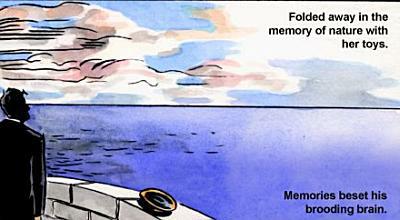
Ulysses "Seen"
Robert Berry
via Levi Asher
Literary Kicks
_______________________
Stately, plump Buck Mulligan came from the stairhead, bearing a bowl of lather on which a mirror and a razor lay crossed. A yellow dressinggown, ungirdled, was sustained gently behind him by the mild morning air. He held the bowl aloft and intoned:
-- Introibo ad altare Dei.
Halted, he peered down the dark winding stairs and called up coarsely:
-- Come up, Kinch! Come up, you fearful jesuit! Yes it's Bloomsday
_______________________

photo - mw
_______________________
Dirge
Kenneth Fearing
(1902-1961)
1-2-3 was the number he played but today the number came 3-2-1;
bought his Carbide at 30 and it went to 29; had the favorite at Bowie but the track was slow—
O, executive type, would you like to drive a floating power, knee-action, silk-upholstered six? Wed a Hollywood star? Shoot the course in 58? Draw to the ace, king, jack?
O, fellow with a will who won't take no, watch out for three cigarettes on the same, single match; O democratic voter born in August under Mars, beware of liquidated rails—
Denouement to denouement, he took a personal pride in the certain, certain way he lived his own, private life,
but nevertheless, they shut off his gas; nevertheless, the bank foreclosed;
nevertheless, the landlord called; nevertheless, the radio broke,
And twelve o'clock arrived just once too often,
just the same he wore one gray tweed suit, bought one straw hat, drank one straight Scotch, walked one short step, took one long look, drew one deep breath,
just one too many,
And wow he died as wow he lived,
going whop to the office and blooie home to sleep and biff got married and bam had children and oof got fired,
zowie did he live and zowie did he die,
With who the hell are you at the corner of his casket, and where the hell we going on the right-hand silver knob, and who
the hell cares walking second from the end with an American Beauty wreath from why the hell not,
Very much missed by the circulation staff of the New York Evening Post; deeply, deeply mourned by the B.M.T.,
Wham, Mr. Roosevelt; pow, Sears Roebuck; awk, big dipper; bop, summer rain;
Bong, Mr., bong, Mr., bong, Mr., bong.
And Wow He Died As Wow He Lived
Kenneth Fearing, the Federal Writers Project, and the depths of the Great Depression.
Jason Boog
Kenneth Fearing : The Poetry Foundation
_______________________
How Good Was American Social Poetry of the Forties?
Anis Shivani
Antigonish Review # 157
What kind of public poetry was being written, apart from the modernist landmarks, around the time the decade-long depression was giving way to the imminence of world war? Were poets aware of a special responsibility for art in those stressed times, and did they perceive a determinative pattern to history? There are some deep veins of poetry here, some exploited later (as in the aggressive style of the Beats), some withering under later McCarthyite pressure, some apparently reaching dead-ends of their own accord. These may be poets accorded only minor status, and their socially conscious poetry might generally not be on par with the work of the English Auden group, but they have left considerable monuments nonetheless. And there is enough of a similarity among them to describe a common style.
Horace Gregory, Joy Davidman, Kenneth Fearing, Genevieve Taggard, and Kenneth Patchen all adopt a form of public speech that returns the reader to his own resources, compelling him to confront the darkness of the reality around him. The attempt always seems to be to isolate typical escapist poetic maneuvers, while there persists a strain of high romanticism that takes flight from the very impotence of the soil, as it were, or the dreariness of the factory floor. The quotidian is carefully observed, from a degree of detachment almost superhuman, to point out its remarkable contours to senses too jaded by the accelerated pace of industrial civilization - and yet the description of the everyday never descends to workmanlike chore. If there is an ultimate fidelity to be detected, it is to the poet's own sacred individuality, not to some specific collective vision of peace and prosperity as such. In fact, the poets don't seem to mind the dirt and dishevelment of the times all that much. By keeping their diction firmly above the commonplace, often indulging in relaxed rhythms and fluid lines that suggest an internal freedom where perhaps it didn't surround them in reality, and being unafraid to demolish any myth of perpetual happiness in popular or high culture, they are interested above all in sanctifying their own sanity in the midst of unprecedented political and economic crisis. The paramount difficulty is the loss of the aesthetic appreciation of existence, they all seem to say.
Rather than range widely over these poets' work, I will concentrate on a few representative poems from the selected period, always quoting the poems in their entirety, and encouraging the reader to dig deeper....(more)
_______________________
Preface
to: Modernism from Right to Left
Alan Filreis
Chroniclers and critics of the 1930s have argued among themselves so unremittingly about the cultural role of radicalism that the newest and most intellectually flexible among them are often hindered rather than liberated by the debate. The bitterness of this fighting has made me somewhat reluctant to present Modernism from Right to Left as a call for similar contentiousness to commence among admirers of modern American poetry. It strikes me nonetheless that the almost total absence of such dispute in discussions of this poetry is one of the reasons why an auspicious direction in the study of modernism's relation to the "clever hopes" of that allegedly "low, dishonest decade." remains largely untried. Another reason, not easily documented, is that those rhetorically trained by American doctoral programs in literature during the past forty years to read poets like Wallace Stevens and Marianne Moore, and to a somewhat lesser extent William Carlos Williams, have not also been attracted to writing that once called itself "revolutionary" in the political sense. After the thirties--one decade when literary radicals were reading these modernists, as I will show--the exceptions have been only very recent. As a corollary to this unwritten professional rule, it might be further supposed that insofar as critics of depression-era writing have, in Cary Ne lson's words, "treat[ed] the political poetry of the period as a unitary phenomenon and reject[ed] it contemptuously (for "unitary" frowningly read "ideological" or even "Stalinist"), critics of Stevens's depression-era writing have congenially embraced his modernism, judging it elastic and accommodating (for these terms happily read "non- ideological" and "anti-Stalinist"). Obviously, the two groups haven't been talking to each other. Why not? Lively and productive, if often bitter, interaction between noncommunists and communists was a fortunate topic of study as soon as, in the 1960s, historians got out from under the proto-Cold War spell of Eugene Lyons's The Red Decade of 1941. Frank Warren's Liberals and Communism (1966) made its rejoinder to Lyons's thesis of "Stalinist penetration of America" not by claiming to the contrary that communism was "at most a very minor influence" on noncommunist thinking in the thirties, but by carefully describing points of intersection and crossing. In one sense, then, my book presents a similar dialogue between those two positions on the matter of poetry, not for the purpose of finding some safe centrism (perhaps Warren's one flaw) but rather to point up a false distinction that separated modernism and radicalism in the first place. ...(more)
_______________________
Poetry and Modernity [PDF]
Octavio Paz
Translated by Eliot Weinberger
_______________________
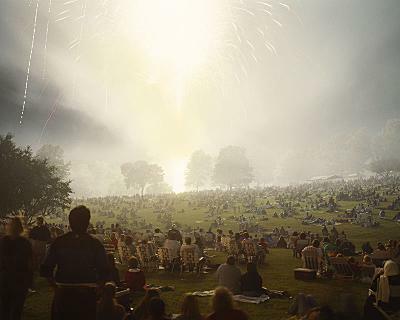
Mike Sinclair
via Heading East
_______________________
Too Poor to Make the News
Barbara Ehrenreich
The human side of the recession, in the new media genre that's been called "recession porn," is the story of an incremental descent from excess to frugality, from ease to austerity. The super-rich give up their personal jets; the upper middle class cut back on private Pilates classes; the merely middle class forgo vacations and evenings at Applebee's. In some accounts, the recession is even described as the "great leveler," smudging the dizzying levels of inequality that characterized the last couple of decades and squeezing everyone into a single great class, the Nouveau Poor, in which we will all drive tiny fuel-efficient cars and grow tomatoes on our porches.
But the outlook is not so cozy when we look at the effects of the recession on a group generally omitted from all the vivid narratives of downward mobility - the already poor, the estimated 20 percent to 30 percent of the population who struggle to get by in the best of times. This demographic, the working poor, have already been living in an economic depression of their own. From their point of view "the economy," as a shared condition, is a fiction.
(....)
The recession of the '80s transformed the working class into the working poor, as manufacturing jobs fled to the third world, forcing American workers into the low-paying service and retail sector. The current recession is knocking the working poor down another notch - from low-wage employment and inadequate housing toward erratic employment and no housing at all. Comfortable people have long imagined that American poverty is far more luxurious than the third world variety, but the difference is rapidly narrowing.
Maybe "the economy," as depicted on CNBC, will revive again, restoring the kinds of jobs that sustained the working poor, however inadequately, before the recession. Chances are, though, that they still won't pay enough to live on, at least not at any level of safety and dignity. In fact, hourly wage growth, which had been running at about 4 percent a year, has undergone what the Economic Policy Institute calls a "dramatic collapse" in the last six months alone. In good times and grim ones, the misery at the bottom just keeps piling up, like a bad debt that will eventually come due....(more) _______________________
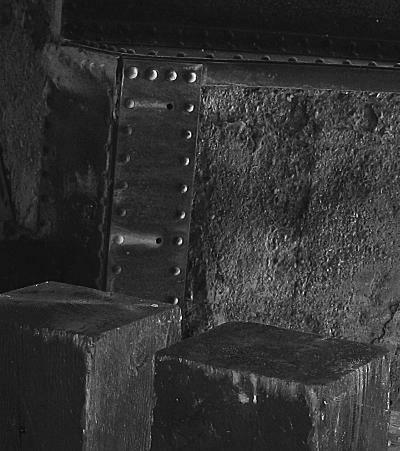
photo - mw
_______________________
But all they are all there scraping along to sneeze out a likelihood that will solve and salve life's robulous rebus, hopping round his middle like kippers on a griddle, O, as he lays dormont from the macroborg of Holdhard to the microbirg of Pied de Poudre. Behove this sound of Irish sense. Really? Here English might be seen. Royally? One sovereign punned to petery pence. Regally? The silence speaks the scene. Fake!
So This Is Dyoublong?
Hush! Caution ! Echoland !
-
Finnegans Wake
|


 Janus Head
Janus Head
 The Age of Briggs & Stratton
The Age of Briggs & Stratton
































































